
FROM FIRSTFRUITS TO PENTECOST (PAGES 8–9)


FROM FIRSTFRUITS TO PENTECOST (PAGES 8–9)


The International Christian Embassy Jerusalem was established in1980 in recognition of the biblical significance of all of Jerusalem and its unique connection to the Jewish people. Today the ICEJ represents millions of Christians, churches, and denominations to the nation and people of Israel. We recognize in the restoration of Israel the faithfulness of God to keep His ancient covenant with the Jewish people. Our main objectives are:
• To stand with Israel in support and friendship
• To equip and teach the worldwide church regarding God’s purposes with Israel and the nations of the Middle East
• To be an active voice of reconciliation between Jews, Christians, and Arabs, and to support the churches and congregations in the Holy Land
From its head offices in Jerusalem, the ICEJ reaches out into more than 170 countries worldwide, with branch offices in over 90 nations.
Our vision is:
• To reach every segment of Israel’s society with a Christian testimony of comfort and love
• To reach and actively represent to Israel the support of denominations, churches, and believers from every nation on Earth
The Christian Embassy is a non-denominational faith-based ministry supported by the voluntary contributions of our partners and friends across the globe. We invite you to join with us as we minister to Israel and the Jewish people worldwide by donating to the ongoing work and witness of the ICEJ.

Dear friends,
Under the shadow of an ongoing war with Hamas and Hezbollah it never wanted, the State of Israel turned 76 a few weeks ago. It’s been eight months since Hamas militants massacred more than 1,200 people and took hundreds more hostage, but the pain and heartache are still fresh. At the same time, we continue to hear testimonies of miraculous protection coming from young IDF soldiers serving in Gaza and of many answered prayers—and this gives us hope and spurs us to continue to help fight Israel’s battle for her existence on our knees.
Recently, I gathered with pastors and ministry leaders from across Israel in southern Israel. We spent several hours alone in the desert to hear what the Lord would say. God strongly impressed Romans 8:19 upon my heart, where Paul describes the whole of creation groaning for the revelation of the sons of God. I sensed that Israel is in a tremendous travail to that end. That night, as we heard testimonies from the younger generation, I realized Israel’s war with Hamas is like a fiery furnace in which God is preparing a new generation of leaders—not only in the local messianic body but for the whole nation. I left the pastors’ gathering greatly encouraged and convinced that God is preparing a strong generation that will give Israel the needed leadership to take it to the next stage of their journey back to Him. We are undoubtedly experiencing historic moments that will forever change Israel—and the world.
Yet the battle continues and is one Israel is fighting on many levels, including against false narratives those against Israel are circulating. In this issue of Word From Jerusalem, ICEJ USA Director Dr. Susan Michael tackles just one of many lies about Israel: that Israel has occupied the West Bank and Gaza since 1967. You’ll also be encouraged by several teaching articles that relate to the restoration of Israel and the prophetic time we are living in. I encourage you to read them!
FROM JERUSALEM
ICEJ President Dr. Juergen Buehler
USA Director Susan Michael
VP International Affairs Dr. Mojmir Kallus
VP Finance David van der Walt
VP Operations Barry R. Denison
VP International Spokesman David Parsons
VP AID & Aliyah Nicole Yoder
Managing Editor/Publications Director Laurina Driesse
USA Managing Editor Karen Engle
Staff Writer Anastasiya Gooding
Graphic Design/Illustrators Ryan Tsuen, Nancy Schimp
Photography Adobe Stock, Adobe Firefly, AP, Getty Images, RTE, Flash90, JAFI, Gospelimages, Wikimedia, Levi Dörflinger, ICEJ Staff and Branches
The New King James Bible is used for all Bible references unless otherwise noted.
Word From Jerusalem is published by the International Christian Embassy Jerusalem. Reproduction in whole or in part without written permission is prohibited. Word From Jerusalem has no subscription price and is supported through contributions worldwide. The ICEJ USA Branch is a 501(c)(3) non-profit organization with offices in Tennessee, Florida, and Washington, DC. All gifts to this ministry are tax-deductible according to United States law.
INTERNATIONAL CHRISTIAN EMBASSY JERUSALEM - USA
Support our ministry online at: www.icejusa.org
Thank you for standing with the ICEJ in such a generous and faithful manner, both in prayer and in your financial support. Please keep us in your thoughts and prayers.
In His abounding grace,

Dr. Juergen Buehler President International Christian Embassy Jerusalem COVER PHOTO: Portrait of Eitan Gonen, father of Romi Gonen who is being held hostage by Hamas terrorists in Gaza. Photo by Yossi Aloni/FLASH90.
FOR MAGAZINE ARCHIVES visit www.icejusa.org/wfj
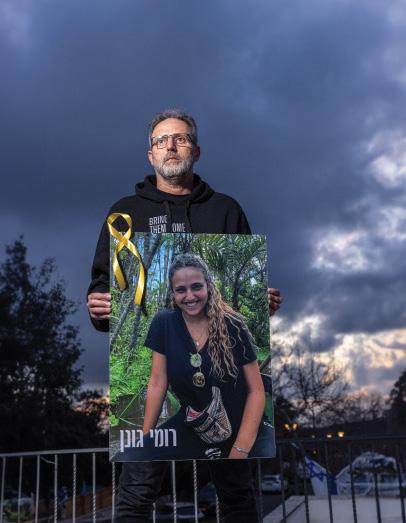
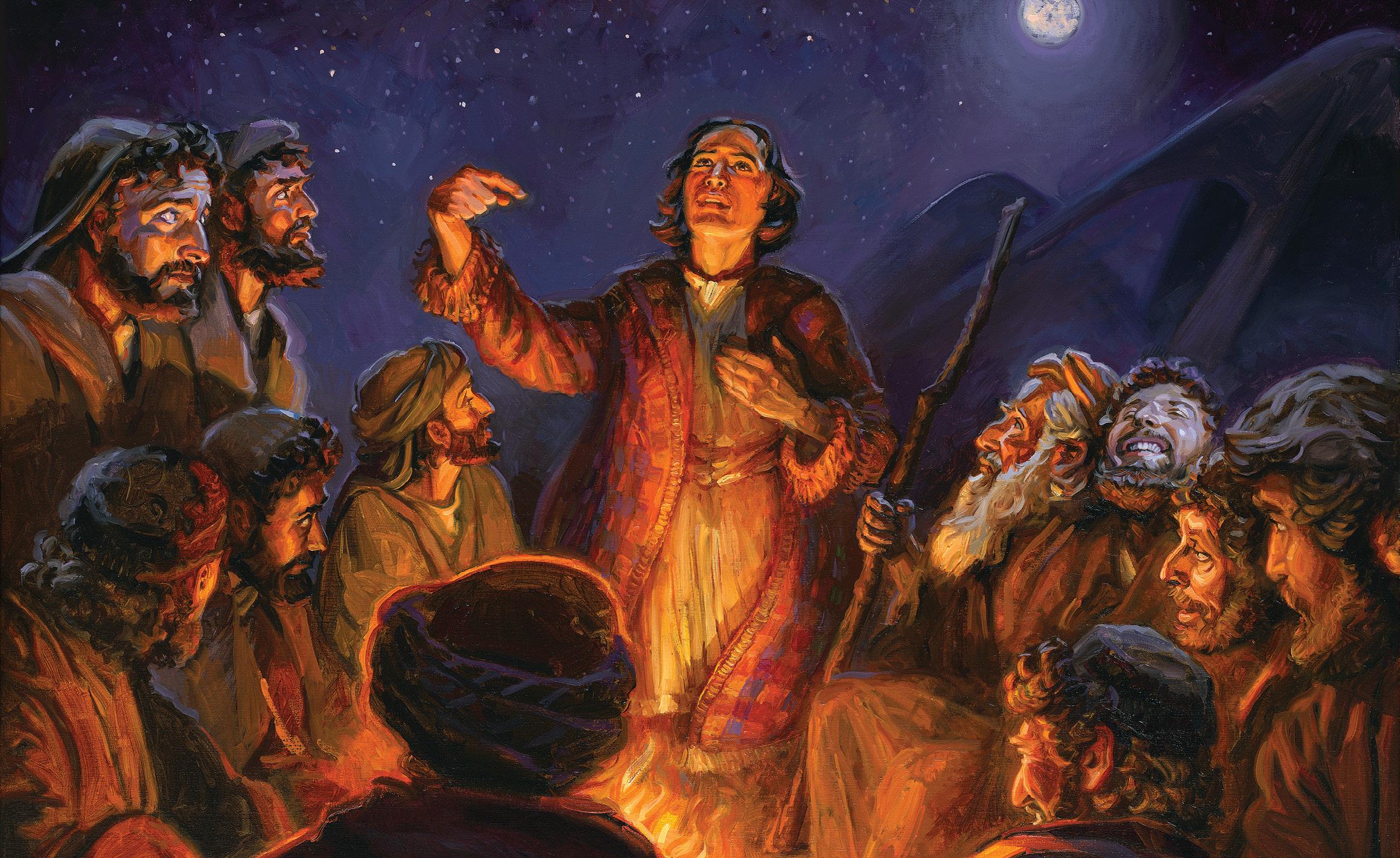
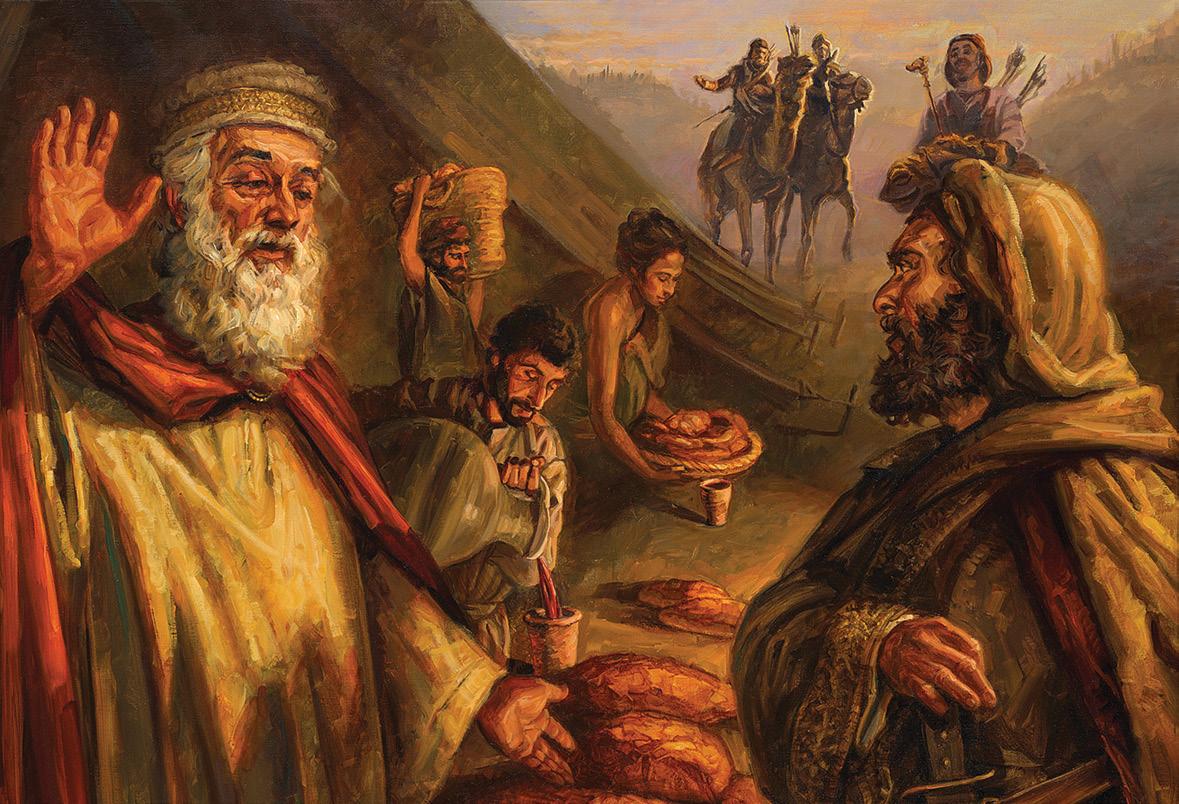
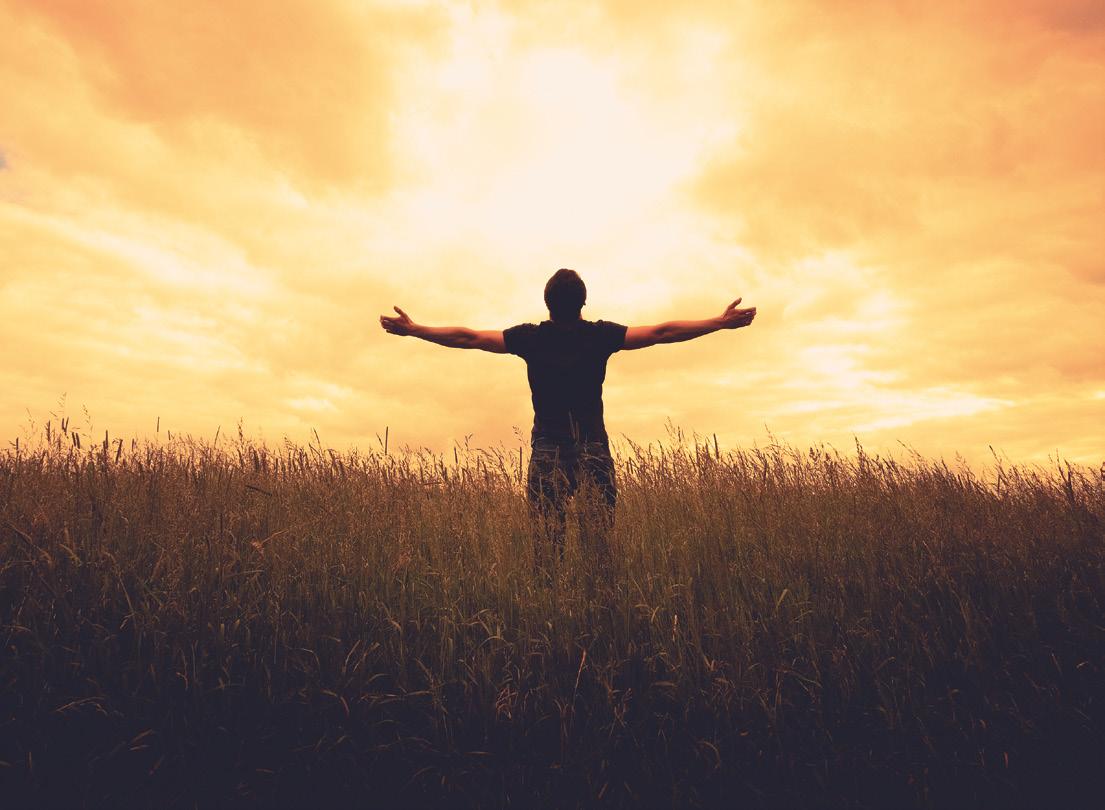
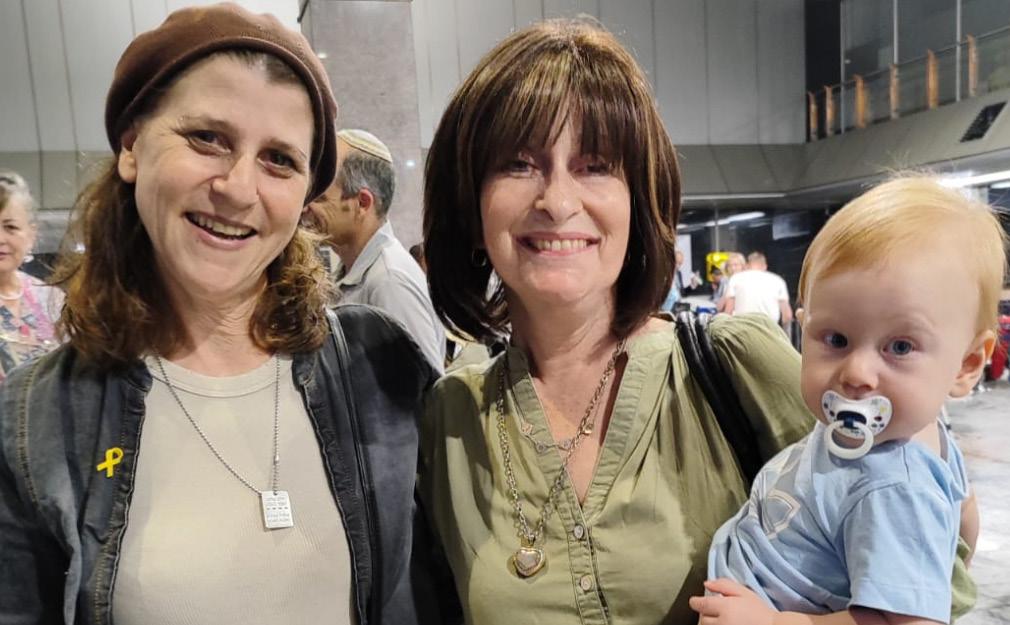
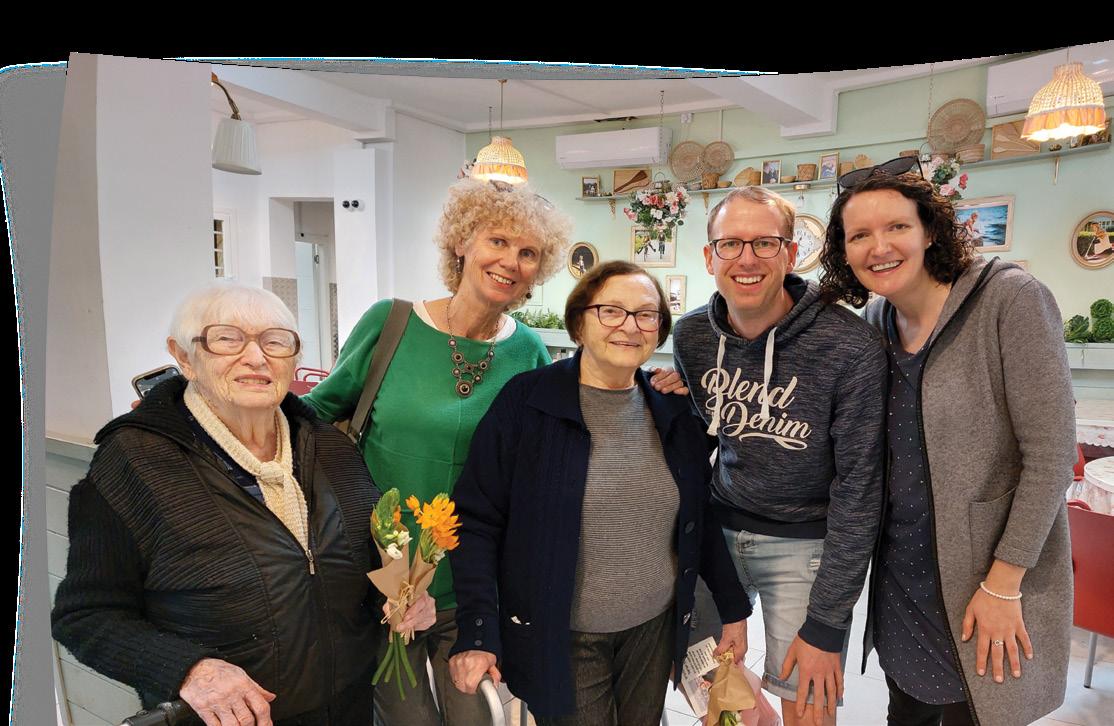

An illustration of Joseph’s dream in Genesis 37:5–10
In our last Word From Jerusalem, we saw Israel represented in Revelation 12 as a woman adorned with 12 stars, the sun, and the moon. In his vision, the apostle John saw imagery that only appears one other time in the Bible—in Genesis 37, where Joseph has two dreams. In one dream, he sees his 11 brothers as stars and his father and mother as the sun and moon, all bowing down to him (Genesis 37:10). Earlier, Joseph had a similar dream, where his brothers appeared as sheaves of wheat bowing down to his sheaf.
Many years later, Joseph was suddenly elevated from prison to viceroy under Pharaoh. The dreams came true when his brothers came to buy wheat from him during a famine in Canaan. These dreams not only foretell Joseph’s amazing rise to rulership in Egypt and role as a prototype of the suffering Messiah but also the broader calling and destiny of the Jewish people.
Both the sheaves of wheat and the stars, sun, and moon represent key aspects of the calling
of Israel. Wheat became a central commodity of Joseph’s reign. Under his leadership, Egypt became the world’s primary breadbasket in a time of global starvation.
The book of Genesis says, “All the earth came to Egypt to Joseph to buy grain, because the famine was severe over all the earth” (Genesis 41:57). In a way, Joseph’s ministry in Egypt foreshadowed the calling God placed upon Israel from the start.
Many times in the Bible, wheat and the bread it produces depict the very word of God. Deuteronomy 8:3 proclaims man does not live by bread alone but by every word that comes from the mouth of God. In Jeremiah 15:16 the prophet found the word of God and ate it. In Luke 8:11 Jesus explains the parable of the sower, saying the seed is God’s word.
Many times in the Bible, wheat and the bread it produces depict the very word of God.
Israel became the nation of the Book, sowing God’s word around the earth. In Romans 3:1–2, Paul declares one of Israel’s main callings was to administer the oracles of God. All the books of the Bible were written by Jews. Psalm 147:19–20 says: “He declares His word to Jacob, His statutes and rules to Israel. He has not dealt thus with any other nation.” That means the main nourishment for our spirit, soul, and body came through the Jewish people.
But there is more! The Jewish people gave the world not only the written word of God, but the Word became flesh and dwelt among us (John 1:14). Jesus is the living Word of God. Therefore, Jesus declares: “I am the living bread which came down from heaven” (John 6:51). Truly, everything that defines our faith as Christians was given to us by the Jewish people, including a Jewish Messiah. It is exactly as God told Abraham: “In you all the families of the earth shall be blessed” (Genesis 12:3).
But what about the second dream? What do
the stars, sun, and moon have to do with the Jewish people? In Genesis, we are informed of their very purpose in the Creation story.
Then God said, “Let there be lights in the firmament of the heavens to divide the day from the night; and let them be for signs and seasons, and for days and years; and let them be for lights in the firmament of the heavens to give light on the earth”; and it was so. Then God made two great lights: the greater light to rule the day, and the lesser light to rule the night. He made the stars also. God set them in the firmament of the heavens … to divide the light from the darkness. And God saw that it was good. (Genesis 1:14–18)
Much can be said about this passage. Let me highlight two reasons why God placed the sun, moon, and stars in the heavens. The main purpose was to “separate the light from the darkness.” The word of God we received from the Jewish people not only leads us to
The word of God we received from the Jewish people not only leads us to God and nourishes our souls, but it also establishes moral guidelines for humanity.
God and nourishes our souls, but it also establishes moral guidelines for humanity. The Ten Commandments represent to this day the moral pillars of most societies. They are more relevant now than ever, as moral boundaries in most Western societies are increasingly blurred.
The prophet Isaiah warns: “Woe to those who call evil good and good evil, who put darkness for light and light for darkness” (Isaiah 5:20).
This moral inversion can be seen today as family values are turned upside down and our God-given genders are under assault. This also can be seen daily as the antisemitic, genocidal Hamas militia is presented as a victim, while the brutally attacked nation of Israel is deemed the aggressor. This is happening at the United Nations and in international courts at The Hague. Radical leftists and even countries like Ireland and Spain fail to discern between good and evil. The God of Israel, Creator of heaven and Earth, provided His word as the ultimate guide to separate light and darkness. It is more necessary than ever that God’s people know His word so they can serve as lights in this darkening world.
But there is one more function for the heavenly luminaries; they are given for signs and seasons and to separate days and years. The Hebrew calendar is different from all other calendars throughout history. It starts with creation and measures the entirety of human history. Not only that, but the Jewish calendar has also impacted the whole world. Right in the beginning of creation, God established a seven-day week and set aside the seventh day to rest from work. This divinely appointed day of rest has made its way into all societies and is even considered a universal human right. In addition, the Hebrew Bible gives us a sacred calendar with set Jewish holidays, known as the feasts of the Lord (see Leviticus 23). Though changed by the Council of Nicea in AD 325, these God-given festivals have still shaped the holiday calendar in most Christian nations.
Israel also serves as a signpost for defining the times and seasons of the nations. Jesus says in Luke 21:29 to “Look at the fig tree.” With this little phrase, Jesus indicated that the reestablishment of the Jewish nation back in their ancient homeland would mark a paradigm shift regarding the times and seasons. In the same chapter, Jesus declares the trampling down of Jerusalem by the nations as the “time of the Gentiles,” suggesting the Jewish restoration to Jerusalem would mark its end. Thus, through Israel, we know we live in a transition period today. The gentile age is closing, and the messianic age is approaching. Therefore, many people rightly say the nation of Israel is God’s time clock.
To the forces of darkness, the revived nation of Israel represents a powerful signpost their time is running out. It also signals to the church that we cannot continue with business as usual.
The restoration of Israel in our time is perhaps the greatest sign of the soon-coming Messiah. To the forces of darkness, the revived nation of Israel represents a powerful signpost that their time is running out. It also signals the church that we cannot continue business as usual. God is calling us to a radical dedication to follow the Lamb wherever He leads (Revelation 12:11; 14:4). It is a time of great conflict in the spiritual realm, and we are called to intercede for Israel as never before. Yet it also is a time of great exploits (Daniel 11:32ff). The events of October 7 and the recent attack of 350 Iranian missiles and drones are signs of a far greater battle in the heavenlies ahead.
I invite you to join thousands of Christians already taking part in our online prayer meetings and to stand with Israel in practical ways by supporting our relief aid projects described in this magazine. May God bless you in doing so.
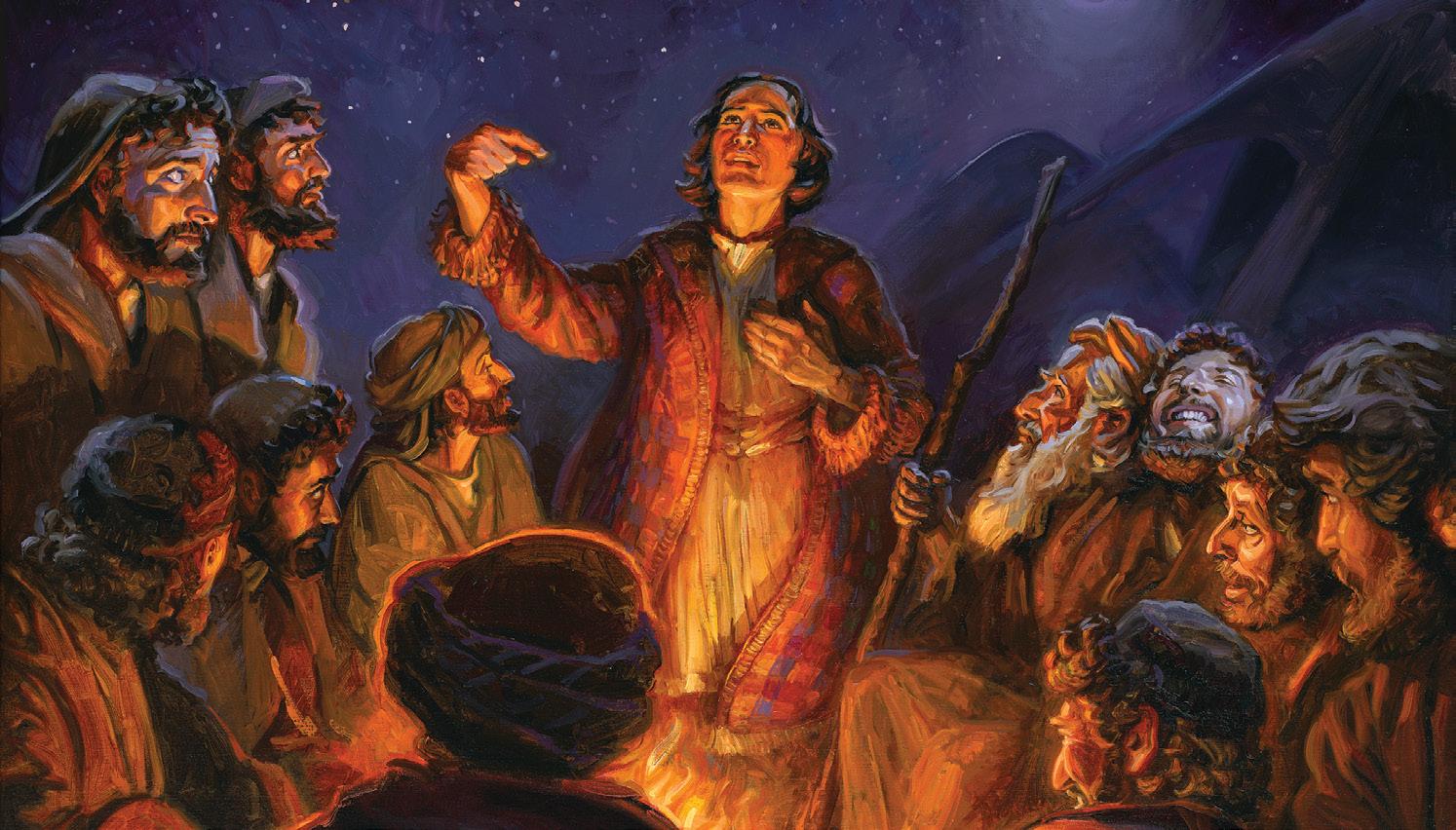
Thus, we see portrayed within the imagery of Genesis 37 and Revelation 12 the unique and weighty calling of Israel. This also explains why Revelation 12:12 warns: “Woe to the inhabitants of the earth and the sea! For the devil has come down to you, having great wrath, because he knows that he has a short time.”

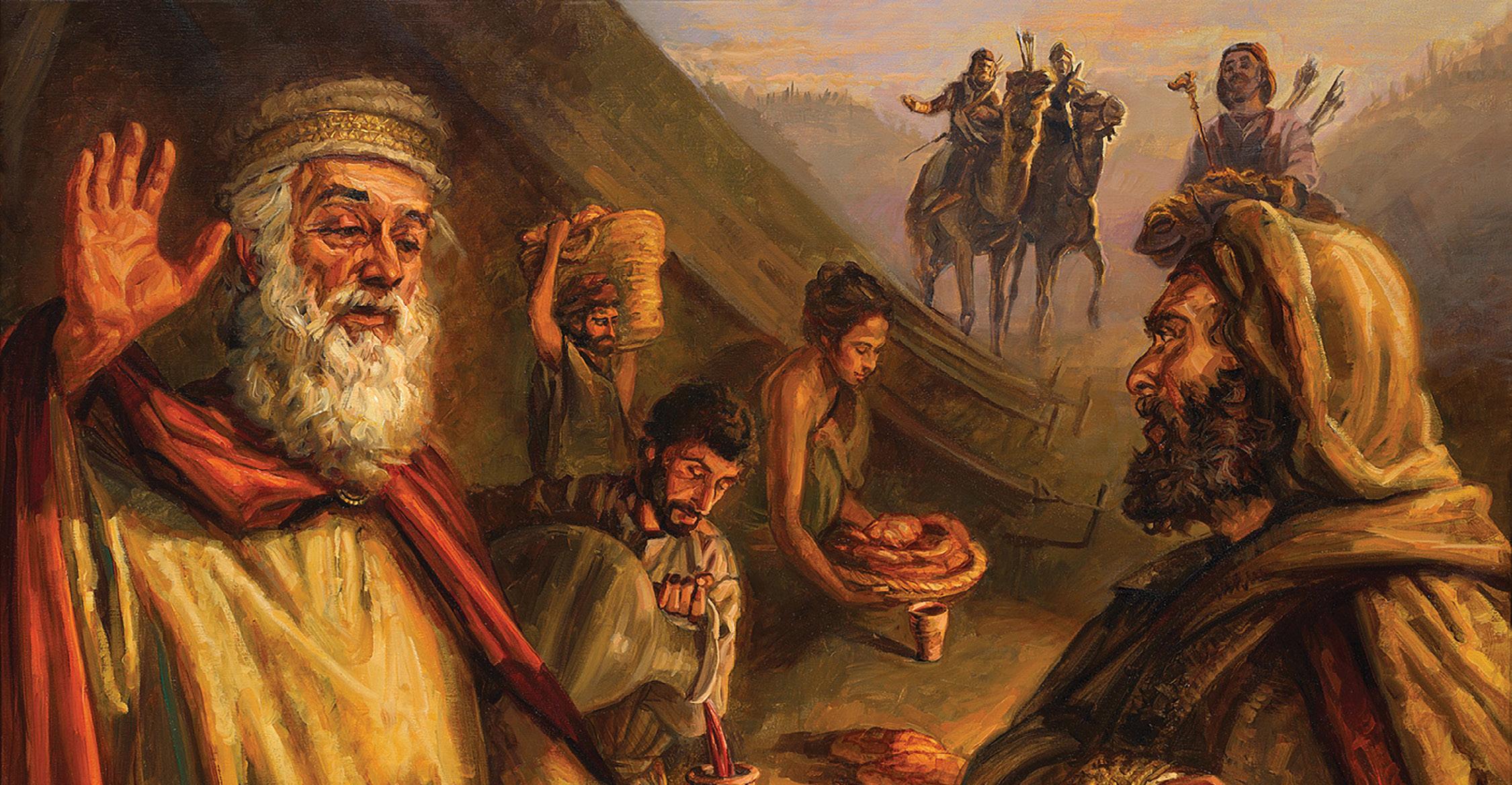
hen Christian, Jewish, and Muslim clergy come together to engage in interfaith dialogue, they often seek to find common ground through the figure of Abraham since all three religions revere his faith. And indeed, the Bible encourages those who “seek the Lord” and “follow after righteousness” to “look to the rock from which you were hewn … Look to Abraham your father … for I called him alone, and blessed him and increased him” (Isaiah 51:1–2).
Indeed, there are enduring lessons and truths we can take from Abraham’s faith walk, which have a direct bearing on the current conflict between Israel and those radical Islamists who seek her destruction.
First, the prophet Isaiah says the Lord called Abraham alone, meaning he was the first person called by God to carry out His redemptive plan. After the flood of Noah, the world was still lost and did not even know how to find God. So the Lord decided to save mankind, and He deposited within Abraham great promises: to bless him, multiply him, make him a great nation and even a father of nations, give him a land, and most importantly, that through him, God would “bless all the families of the earth” (Genesis 12:3).
This last promise is the most important one— the apostle Paul calls it the first preaching of the gospel (Galatians 3:8). That is, through Abraham and his seed, the Lord would offer a blood covering for sin (Genesis 28:14; Psalm 32:1–2; Romans 4:1–8). Note that this redemption would come via Abraham’s natural descendants, through Isaac and Jacob—the children of promise—and not through Ishmael or Esau. So whatever revelation the prophet Mohammed had to offer had nothing to do with God’s calling over Abraham to save the world. Jesus Himself said, “Salvation is of the Jews” (John 4:22).
should all “bless” (speak well of) Abraham and his descendants, the Jewish people. Melchizedek did! Yet much of the world curses Israel to their own harm.
Interestingly, the writer of Hebrews makes a point to say that Melchizedek came to bless Abraham as he was “returning from the slaughter of the kings” (Hebrews 7:1). He could have come to Abraham at any time—why right as Abraham was coming back from battle?
The lesson here is that unlike Mohammed, Abraham never lifted his sword to spread his faith in God. But he did take up the sword to take back that which had been stolen and abducted—his nephew Lot and the people and goods of Sodom (Genesis 14:14–24). This was a just act of war, and Melchizedek, a forerunner of Yeshua the Messiah (Psalm 110:4; Hebrews 7:14–22), came to bless him at that very moment. This does not sound like a pacifist, and indeed, neither is the Lord.
In the very next chapter, the Lord told Abraham: “Do not be afraid, Abram. I am your shield, your exceedingly great reward” (Genesis 15:1). God was the One who protected Abraham and gave him victory in the battle. And the Lord was promising always to be a shield over Abraham. The Lord knew He would always have to guard the Jewish people to protect His redemptive mission. This has been necessary, as Israel has faced many enemies through the centuries.
There is no question then that we should all “bless,” or speak well of, both Abraham and his descendants, the Jewish people. Melchizedek did!
Today, radical Islamists claim to have a different way of salvation. They have raised the sword to spread their extremist faith. Even worse, they have raised the sword against a particular people they should be blessing. And they have raised the sword against a people God has vowed to protect. In all these things, they do not “look to Abraham” as a father of godly faith, and they certainly do not “follow after righteousness.”
This same truth was affirmed early on when the mysterious figureMelchizedek, priest of the Most High God, came and “blessed him who had the promises” (Hebrews 7:6). Abraham alone carried the promise of world redemption within him. There is no question then that we
Israel, on the other hand, has taken up the sword to justly defend the nation and return those violently abducted into Gaza. May they succeed in bringing them home soon!
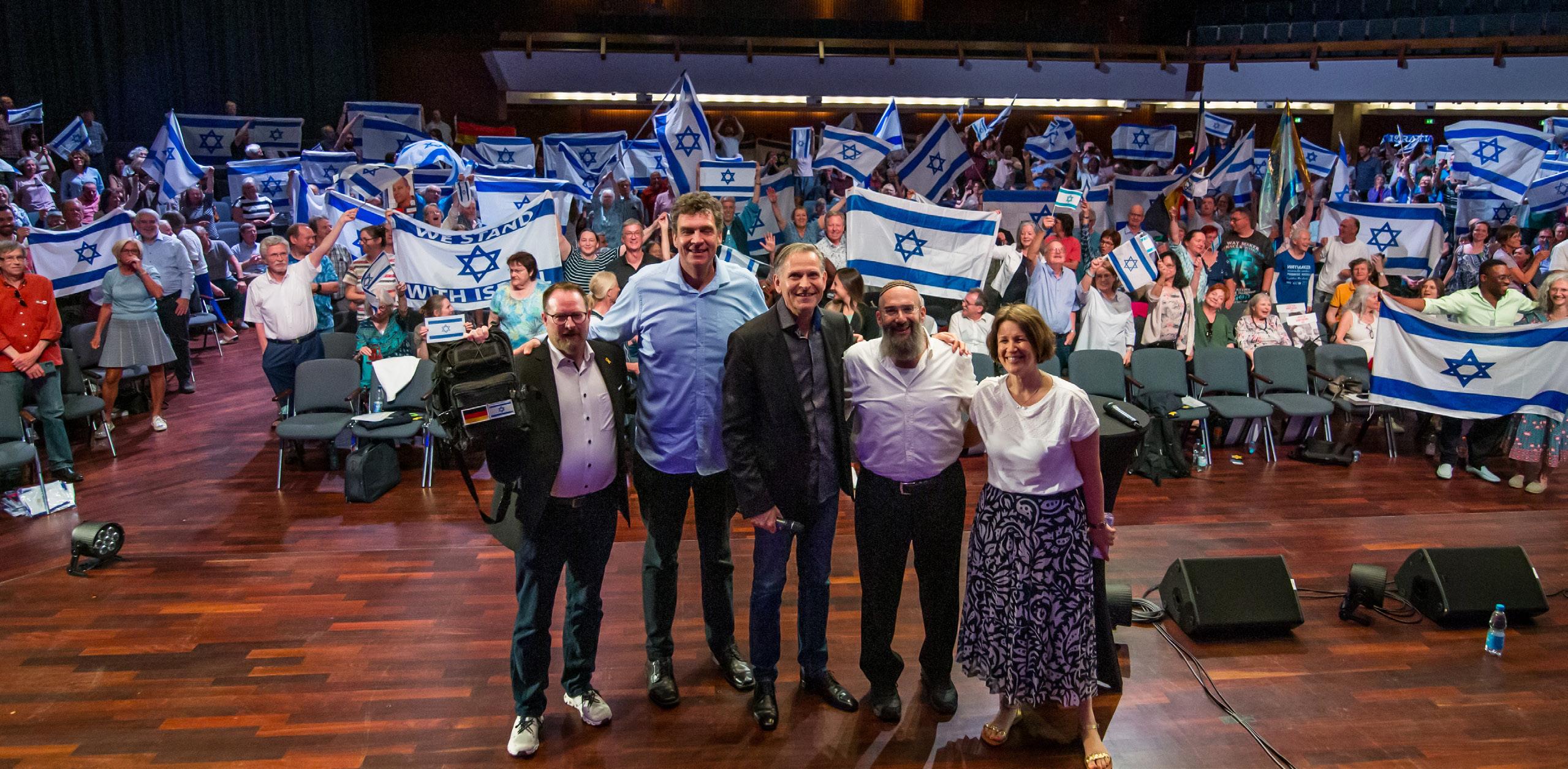
In early May, Israel observed Yom HaShoah—its annual Holocaust Remembrance Day that commemorates the lives of the 6 million Jews who perished in the Holocaust between 1933 and 1945. Scores of Christians worldwide stood with Israel in public rallies and earnest prayer, including various national branches of the International Christian Embassy Jerusalem.
“There is a groundswell of Christian support for Israel around the globe during this special time of remembering the Holocaust and paying respect to the millions of Jewish victims of the Nazi genocide,” said ICEJ President Dr. Juergen Buehler. “This outpouring of Evangelical love and concern for Israel is finding expression in many countries right now because the Hamas atrocities of October 7, 2023, touched the raw nerve of the Holocaust. So many Christians want to reassure the Jewish people they have far more friends than all the rabid antisemites taking over college campuses in recent weeks.”
In Jerusalem the ICEJ was invited to send representatives Nicole Yoder and Jannie Tolhoek from our staff to lay a wreath in the Hall of Remembrance during the official state ceremonies at Yad Vashem. And at our Home for Holocaust Survivors in Haifa, ICEJ Team Director Yudit Setz addressed a large gathering to mark Yom HaShoah that included Members of the Knesset and scores of Holocaust Survivors with their families. “Precious Holocaust Survivors, I embrace you on this difficult day in the name of thousands of Christians who love you and stand with you,” shared Yudit. “The ICEJ represents Christians who have echoed the words of Ruth spoken to Naomi: ‘Your people are my people, and your God is my God.’ In the nations we stand with you in prayer, in action, fighting against antisemitism and standing for what is right. You are not alone!” Meanwhile, ICEJ national branches around the world supported Israel through various events remembering the Holocaust
The ICEJ Germany branch helped stage a large march of Christians in Stuttgart to stand in solidarity with Israel and combat antisemitism. They also held a prayer rally in Stuttgart that more than 600 Christians
from across Germany attended. Waving Israeli flags and shouting. Am Israel chai! (“The people of Israel live!”), the crowd warmly received Israeli guest speaker Rabbi Shmuel Bowman before everyone dropped to their knees in fervent prayer for the Jewish nation and people.
ICEJ Norway National Director Dag Oyvind Julissen hosted a proIsrael conference in Oslo featuring an Israeli survivor of the Nova music festival who told his incredible story of being saved by an Arab farm manager.
The ICEJ Slovakia branch organized its fourth public rally for Israel since October 7—this one in Bratislava—and another recent gathering drew 25 Christian pastors to support the launch of a local ICEJ think tank to promote closer ties between Slovakia and Israel.
ICEJ Finland
A large Yom HaShoah event in Helsinki, Finland, drew hundreds of ICEJ members who joined other pro-Israel Christians in a gathering linked to the March of Life that was happening simultaneously in many cities worldwide.
ICEJ USA
ICEJ USA National Director Dr. Susan Michael (pictured at right) spoke at the annual Day of Prayer and Solidarity event hosted by the Embassy of Israel in Washington, DC.
ICEJ Italy
In Milan, ICEJ Italy National Director Sara Britti attended a ceremony hosted by the Chief Rabbi of Milan where Auschwitz Survivor Liliana Segre was named a “Senator for Life” by Italian President Sergio Mattarella.
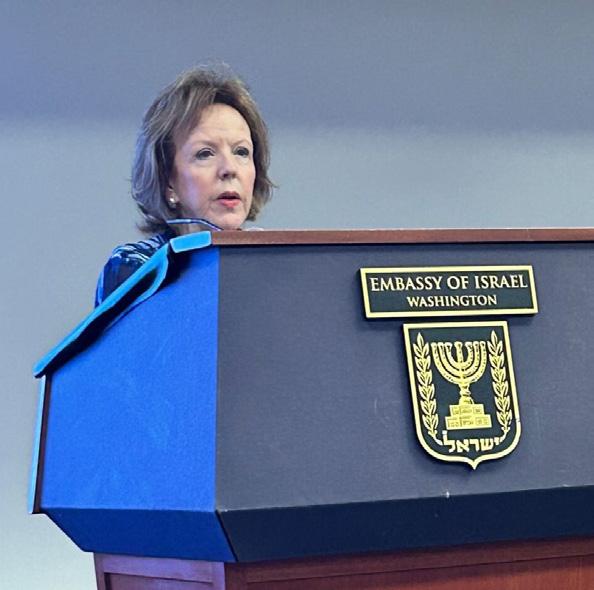


like to count. When I know there’s a vacation coming and it’s getting close, I start mentally checking off days on my calendar. Six more days of work … now five … only four! You get the idea and can probably relate.
God knows this about people and established a unique period of reckoning time in the Old Testament called “counting the omer” that would be fulfilled in the New Testament and culminate with Pentecost—a feast on God’s calendar that would mark the beginning of His new way of operating in the world.
Counting the omer starts at the Feast of Firstfruits and ends with Shavuot (Pentecost, or the Feast of Weeks)—this year falling on June 12. God’s instruction for these days of counting is found, among other places, in Leviticus 23:15–16:
And you shall count for yourselves from the day after the Sabbath, from the day that you brought the sheaf of the wave offering: seven Sabbaths shall be completed. Count fifty days to the
day after the seventh Sabbath; then you shall offer a new grain offering to the Lord.
God instructed Israel to celebrate the Feast of Firstfruits on the day after the weekly Sabbath, which means Firstfruits most likely would have always been on a Sunday. (Jewish scholars differ on which Sabbath God intended in Leviticus 23:15—the weekly Sabbath or another Sabbath—resulting in four different dates adopted by different Jewish sects. However, the simplest interpretation is that it refers to the weekly Sabbath during Passover week, Friday sundown to Saturday sundown.)
On that day, the Jewish people were to bring the first sheaves (in Hebrew, an omer) of the barley harvest to the temple. The JPS Dictionary of Jewish Words says the Hebrew word omer means “sheaf”—a measure of grain equal to about two quarts of barley. They were to bring their omer offering before reaping or even touching the rest of the harvest, where it was ground into a course meal, sifted, and then given to the priest who poured oil and frankincense over it. In his book The Temple: Its Ministry and Service, Alfred Edersheim says
the priest then waved it back and forth, up and down, before burning a small handful of the mix on the altar. The offering was symbolic of repayment to God for providing manna in the desert:
Then Moses said, “This is the thing which the Lord has commanded: ‘Fill an omer with it, to be kept for your generations, that they may see the bread with which I fed you in the wilderness, when I brought you out of the land of Egypt.’” (Exodus 16:32)
It was also the people’s act of consecrating the remaining harvest to God. If God “accepted” the omer offering, they knew He would accept the entire harvest.
But the offering signaled the start of something else: 49 days (seven weeks) of “counting” that concluded the next day, day 50, with Shavuot (Pentecost):
You shall count seven weeks for yourself; begin to count the seven weeks from the time you begin to put the sickle to the grain. Then you shall
keep the Feast of Weeks to the Lord your God with the tribute of a freewill offering from your hand, which you shall give as the Lord your God blesses you. (Deuteronomy 15:9–10)
This period of counting days in Hebrew is called Sefirat ha-Omer and linked the Exodus out of Egypt with the giving of the law—for on day 50 after leaving Egypt, the children of Israel arrived at Mount Sinai. Here, God performed His first act as Israel’s King by establishing His law. The law, or torah, was God’s instruction for how His people were to operate in His kingdom so that they would be set apart from the watching, godless nations whose people would thus be drawn to the goodness and faithfulness of the One True God.
Shavuot (Pentecost) in the New Testament was the fulfilment of what happened at Sinai, Jesus—the living Torah—being poured out in the hearts of the disciples. Through God’s people, the church, God’s law would now go out to the nations.
Ever since the Romans destroyed the temple in AD 70, Jews have not been able to observe this omer offering. However, many Jews today still count the days and weeks that have passed since Firstfruits. This daily counting reminds
the Jewish people of the importance of each day and provides them an opportunity for introspection and growth.
Jesus and the Counting of the Omer As with the feasts, there is great significance of this 50-day count related to Jesus.
First, consider the time span of the first 40 days. Significant events occurred during the timespan of 40 in the Bible, whether 40 days or 40 years: the Israelites wandered the desert for 40 years; Moses descended Mount Sinai with the law after 40 days; and Satan tempted Jesus 40 days in the wilderness, to name a few. Clearly, the number 40 is important in God’s reckoning of time, and this is true of the first 40 days of counting the omer
Most significantly, Jesus walked the earth for 40 days after being resurrected from the dead—during the first 40 days that all Israel was counting the omer. All of Jesus’ post-resurrection appearances occurred in those 40 days. Though Scripture doesn’t give details of the disciples “counting” during that time, it’s clear Jesus was preparing them for His departure on day 40, when He would ascend to the Father:
After his suffering, he presented
himself to them and gave many convincing proofs that he was alive. He appeared to them over a period of forty days and spoke about the kingdom of God. (Acts 1:3, emphasis added)
Ten days later, on the fiftieth day of the counting of the omer, as the disciples were back in Jerusalem to keep Shavuot, God’s Spirit poured out on the disciples—the same day all Israel was remembering the giving of God’s instruction at Mount Sinai.
Dr. Richard Booker writes in his book Jesus in the Biblical Feasts that counting the omer “helped people keep their focus on the Lord and His special feast days.” It linked for them the Exodus out of Egypt with the giving of the law at Mount Sinai and how God redeemed them at Pesach (Passover) and gave them His law at Shavuot (Pentecost).
Just as counting the omer linked the Exodus out of Egypt with the giving of the law at Mount Sinai, so, too, do the 50 days after Jesus’ resurrection link His disciples’ journey out of “Egypt.” Jesus redeemed those out of the world with His death on the cross, and for those who believe, provides the Helper, the Holy Spirit, to be able to walk in His presence continually—the Word made flesh, the “living Torah,” now dwelling within them.
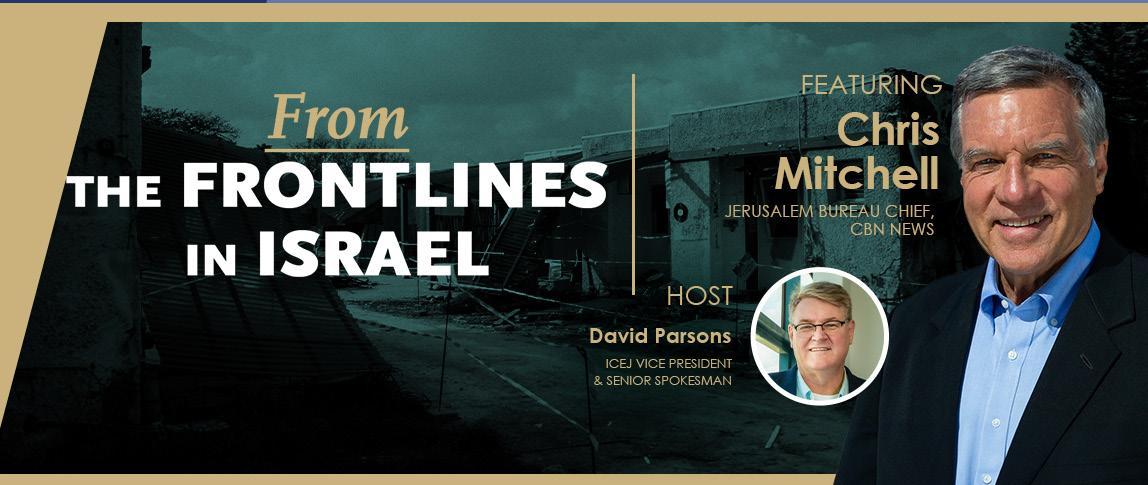





“For you are my hope (tikvah), O LORD God: you are my trust from my youth.” (Psalm 71:5)
Would you wait differently if you had an assurance of a certain conclusion? In the English language we casually use the word “hope” to mean a “wishful thought” or “optimistic desire,” such as: “I hope it doesn’t rain this weekend.” The lack of strength behind the English word “hope” can cloud our understanding of the powerful promise of biblical hope, which, in contrast, is a “guaranteed assurance of a desired outcome.”
Israel’s devotion to hope is truly awe-inspiring. What would a people ravaged by millennia of persecution and exile choose as their national anthem? No one would have blamed them for lamenting as Ezekiel did: “Our bones are dried up; our hope (tikvah) is lost.” (37:11) But remarkably, the collective heart song of the Jewish people instead declares: “Our hope is not yet lost, our hope of two thousand years, to be a free nation in our Land, the Land of Zion and Jerusalem.”
T he words to this anthem, “Ha-Tikvah” (“The Hope”), were written in 1878, 70 years before the Jewish people’s long-awaited desire was finally realized. The hope they had placed in their faithful God and in His promise to replant them in their homeland was firmly planted in biblical truth: “And there is hope (tikvah) in your end, says the LORD, that your children shall come again to their own border” (Jeremiah 31:17).
Tikvah (הָוְָקְּתִּ) speaks of certain hope and derives from the Hebrew verb qavah (הָוָָקְ), which means, “to gather together, wait for, hope for, or bind (by twisting) together.” While the idea of hope in English is abstract, this Hebrew root word offers us a helpful visual of hope as an everstrengthening rope. In fact, Rahab’s “scarlet cord,” a beautiful symbol of the hope of salvation, was called a tikvah in Hebrew (Joshua 2:18).
Traditionally, to make a durable, useful rope, the process of binding and twisting many fibers together in a careful, lengthy process was essential. Our instant-gratification culture has taught us that waiting is a waste, but the Hebraic, biblical viewpoint highly values it: “But they that hope/ wait expectantly (qavah) upon the Lord shall renew their strength” (Isaiah 40:31a).
We may not know the details, but the substance of our hope is secure and firm. Hope is summed up in the Lord Jesus. He is our hope incarnate, and He will not fail.
However, let us steer away from the dangerous temptation of offering false hope—to ourselves or to one another—in the form of unfounded “assurances” that contradict or go beyond what the Scriptures say. “My soul, you wait only upon God; for my expectation (tikvah) is from him” (Psalm 62:5).
Hope is a gift that God has given His children. Hope comforts us in our sorrows, fills us with courage to face our daily walk, and envisions us for the future. Cling to biblical hope like the sturdy rope that it is!
“Surely there is a future, and your hope (tikvah) will not be cut off” (Proverbs 23:18).
Melissa Briggs is an experienced Hebrew teacher passionate about making the riches of the Hebrew language accessible to everyone. Receive $50 off Explore Hebrew courses for beginners with coupon code “ICEJ”. For every code used, Melissa will donate $30 to the work of the ICEJ. Learn more at: www.iceju.org/p/explore-hebrew
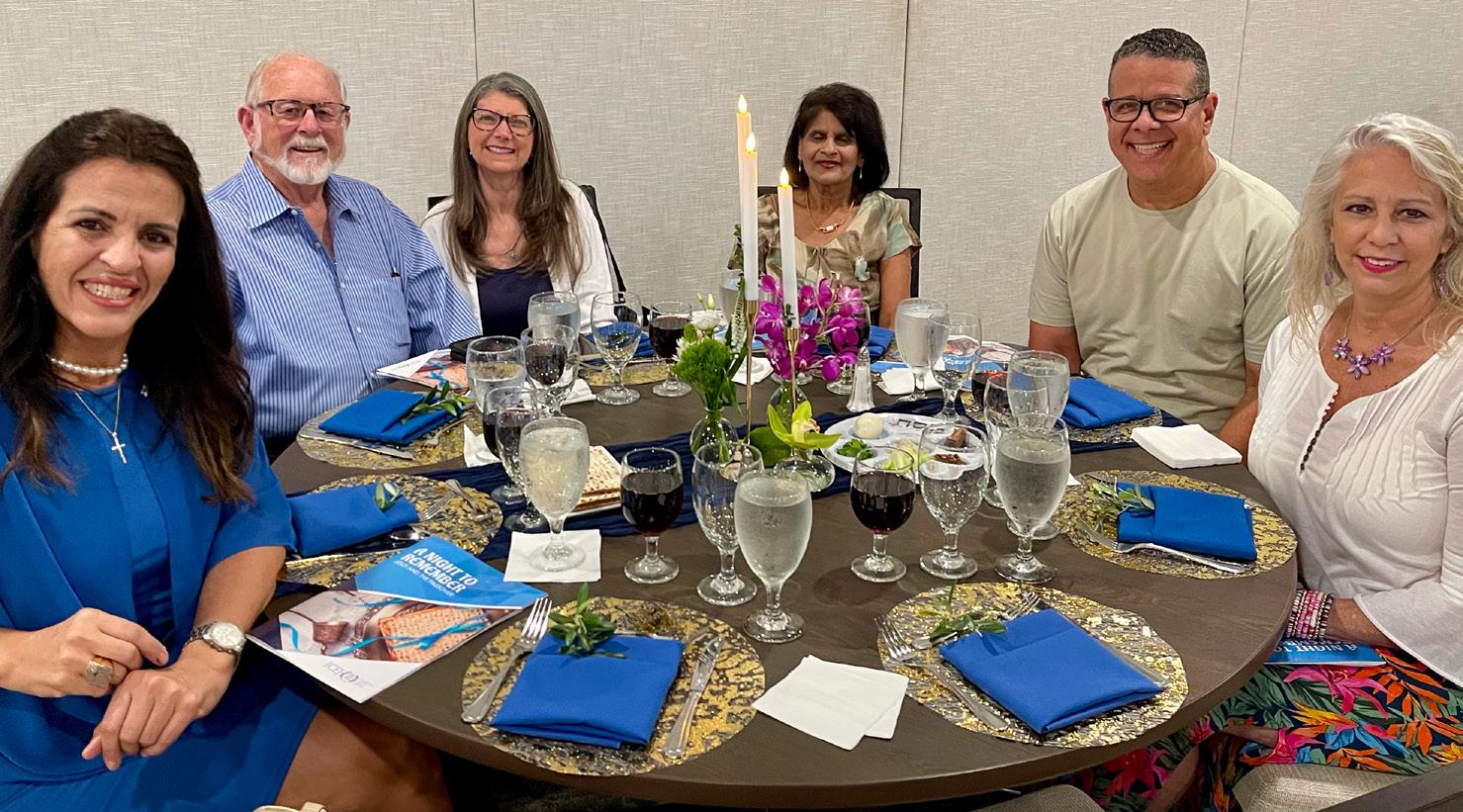
Participating in a Passover seder is a beautiful way for Christians to keep in step with Jewish people around the world who celebrate it every year to remember how God redeemed them “with a mighty hand and an outstretched arm” out of Egypt (Deuteronomy 26:8)—and also to unlock the significance of our Lord’s last supper. This year, with what happened on October 7 and knowing the pain and grief Israelis are still experiencing, it was especially meaningful for us at ICEJ USA.
Several of our staff members hosted a seder this year, including two virtual seders. Shannon Bennett, our ICEJ USA communications director, hosted a seder for her church’s singles group in Orlando, Florida, and said participants were surprised at how experiential it was:
“There were times of laughter and moments where the picture of Jesus’ sacrifice for us that Passover points to was clear and sobering.” Shannon shared that people came to the seder who rarely come to the singles group meetings.
“The next week a visitor came who heard about the seder and wanted to ask me questions about the biblical feasts.
“The seder reconnects me to the reality of God’s faithfulness over thousands of years of history
and to all of those who celebrated before me dating back to the Hebrews of the original Exodus story,” Shannon added.
Also in Florida, our director, Dr. Susan Michael, hosted a large seder of about 60 participants, led by ICEJ USA Board member Dr. Tony Crisp, at Calvary Chapel Ft. Lauderdale. “Calvary Chapel is my home church, and we have taken over 300 of their members on tour to Israel. Many were greatly impacted and awed by the seder. It was a very special evening, and we are already scheduling one for next year,” said Susan.
ICEJ USA Managing Editor Karen Engle hosted a virtual seder over Zoom, and 25 people from four different states joined in. Most participants gathered all the items for the seder and even lit candles at the beginning, giving them a full, immersive experience even while online. “Everyone used our new Passover seder booklet A Night to Remember so they could follow along,” Karen said. “The beautiful thing about doing it online was that it allowed for time at the end for questions, which opened even deeper conversation about the significance of Passover for Christians, as well as what is happening in Israel and around the world.”
It’s not too early to start planning a seder for next year—many churches set their event calendars a year or more out. For more information or help planning a seder, go to: www.icejusa.org/seder

The National Day of Prayer on May 2 was once again followed by the Day of Prayer and Solidarity with Israel event held at the Embassy of Israel in Washington, DC. ICEJ USA Director Dr. Susan Michael has served on the host committee for that annual event since its inception in 2002 and said, “After COVID put this gathering on hold for several years, it was a real joy to be part of the restart of this significant annual show of Christian solidarity with Israel.”
The event was particularly important this year due to the anti-Israel protests taking place on college campuses as well at the very entrance of the Israeli Embassy. Christian leaders arriving at the Embassy had to walk through a city block of anti-Israel posters and displays as well as activists blowing loud sirens through megaphones to harass Embassy visitors and staff.
The gathering was hosted by His Excellency Ambassador Michael Herzog, and in his remarks, he thanked Christians for their support and asked that the leaders present do everything possible to keep support for Israel strong both in their congregations and on college campuses.
Other speakers included October 7 Survivor Lahav Deri, ICEJ USA Director Dr. Susan Michael, National Day of Prayer President Kathy Branzell, Former US Commission on International Religious Freedom Member Johnnie Moore, and Chaplain of the US House of Representatives Margaret G. Kibben. Prayers were led by American Christian Trust Director Mark Pritchett, Urban CURE President Star Parker, and Zionist Rabbinical Coalition President Rabbi Stuart Weinblatt.
The powerful prayers and inspiring words of solidarity with the Jewish people and the Jewish state greatly encouraged Embassy diplomats and staff and sent a strong message to the people of Israel that millions of Christians are standing with them at this critical moment.
Seder participants at Calvary Chapel Ft. Lauderdale
Experts are warning of a growing mental health crisis in Israel due to the current war with Hamas, with one in three individuals impacted by the conflict expected to grapple with post-traumatic stress disorder (PTSD) in the months ahead. The national health services already report a 25% increase in psychiatric drug usage, a 52% surge in anxiety-related cases, and a 45% rise in post-trauma diagnoses.
A new medical study of 700 Israelis also confirmed that the prevalence of PTSD has almost doubled since October 7. The lead researcher noted that 38% of respondents have considered suicide. As a result, Israeli President Isaac Herzog has insisted that strengthening the mental health system must be a “top national priority in the long years of rehabilitation ahead of us.”
In response, the ICEJ has supported a range of rehabilitation and therapeutic efforts. One such initiative is a brand-new “Balancing Home” for PTSD patients in Migdal HaEmek, northern Israel. The home is a haven for those experiencing acute trauma symptoms, including IDF soldiers, survivors of the Nova music festival massacre, October 7 victims, and veterans from previous wars.
The Christian Embassy provided the initial start-up funding to completely renovate the apartment building for this “Balancing Home” that would serve as a haven for PTSD sufferers. Our decision to invest in the new treatment center came before the war, not yet fully realizing how crucial it would be for so many hurting Israelis.
One aspect that drew the ICEJ to the project was that the recovery home will be a self-sustaining business with state health funds and disability grants covering treatment costs, thus guaranteeing longterm financial stability. The founders are confident this first home will prove successful and allow them to establish similar self-supporting homes across Israel.
The home uses a range of creative therapy practices, such as music and art, gardening, animal therapy with dogs, resilience building, and much more. The home will also arrange individual and group therapy sessions to help PTSD sufferers work through bad memories and their triggers and develop coping techniques.
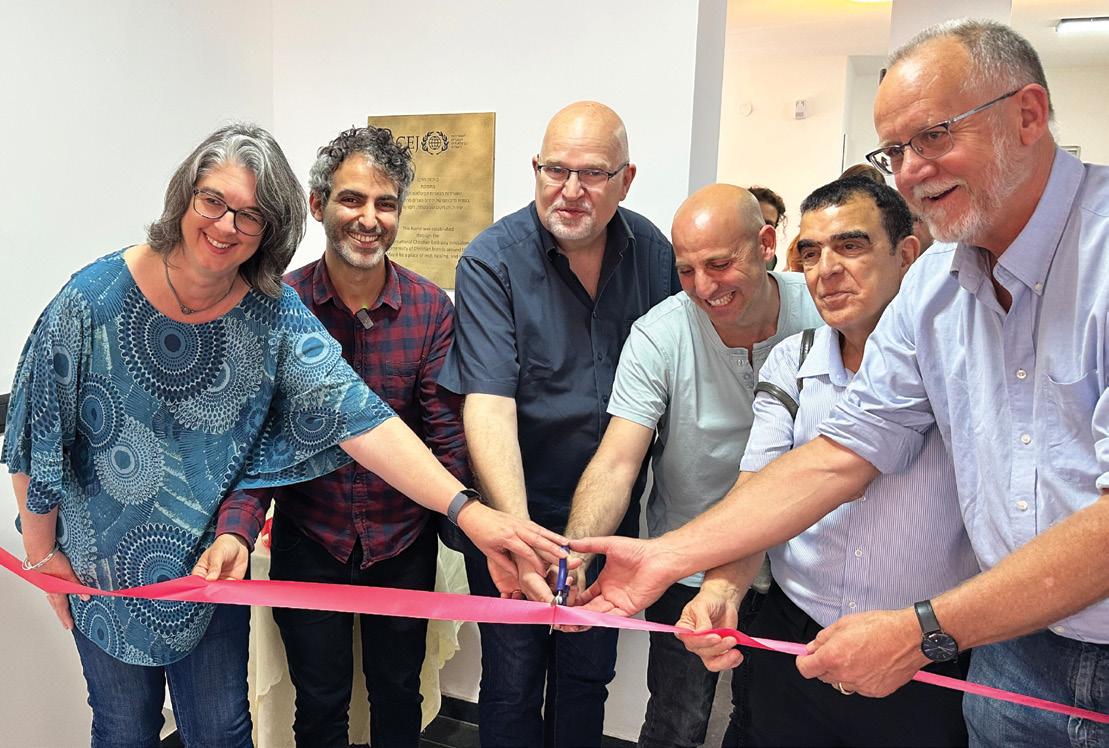

A comfortable and relaxing room in the new ICEJ-sponsored trauma recovery home in northern Israel helps create a sense of calm for PTSD sufferers.
Recently, the ICEJ staff paid a visit to dedicate the new PTSD recovery home. As we entered the home’s beautiful rooms filled with board games and musical instruments, we felt a sense of community that embraced restoring hope and nurturing personal growth. Indeed, it is a transformative space that empowers residents to embrace the future again.
One resident told ICEJ Vice President of AID & Aliyah Nicole Yoder: “This place has given me my life back.” And cofounder Maor Biton told us:
The home is a special model. Initially, homes like these were not regarded as effective. However, we have witnessed remarkable transformations among our residents, especially youth and young adults. The communal environment here fosters growth and encourages individuals to explore their giftings while also equipping them for the future.
Maor added that the home had been in operation for only three weeks, and already the Ministry of Defense had referred individuals there— even before they were ready to receive them. He also noted that for most residents, PTSD developed after they returned to some sense of normalcy in familiar settings like their homes, schools, or workplaces and that swift treatment can help prevent lifelong symptoms.
“Before the war, Israelis were already enduring long waits for psychological assistance, and now the situation is even more dire,” Maor explained. “Our priority is to respond promptly to those referred to the home and providing effective treatment to as many individuals as possible. And it is a joy to see that the treatment indeed works!
“Thank you for believing in us from the start and recognizing the importance of our vision. Your support means everything to us and to Israel,” Maor concluded.
ICEJ President Dr. Juergen Buehler thanked our hosts for the warm reception and added: “We hold on to hope that one day, homes like these will no longer be needed. Until then, we remain committed to restoring normalcy and bringing healing to a nation in need.”
In the future, this PTSD recovery home sponsored by the Christian Embassy will stand as a beacon of hope and healing. With Israel’s growing mental health crisis, our continuing support is needed to help treat those traumatized by the current war. So please give generously to our Israel in Crisis fund.
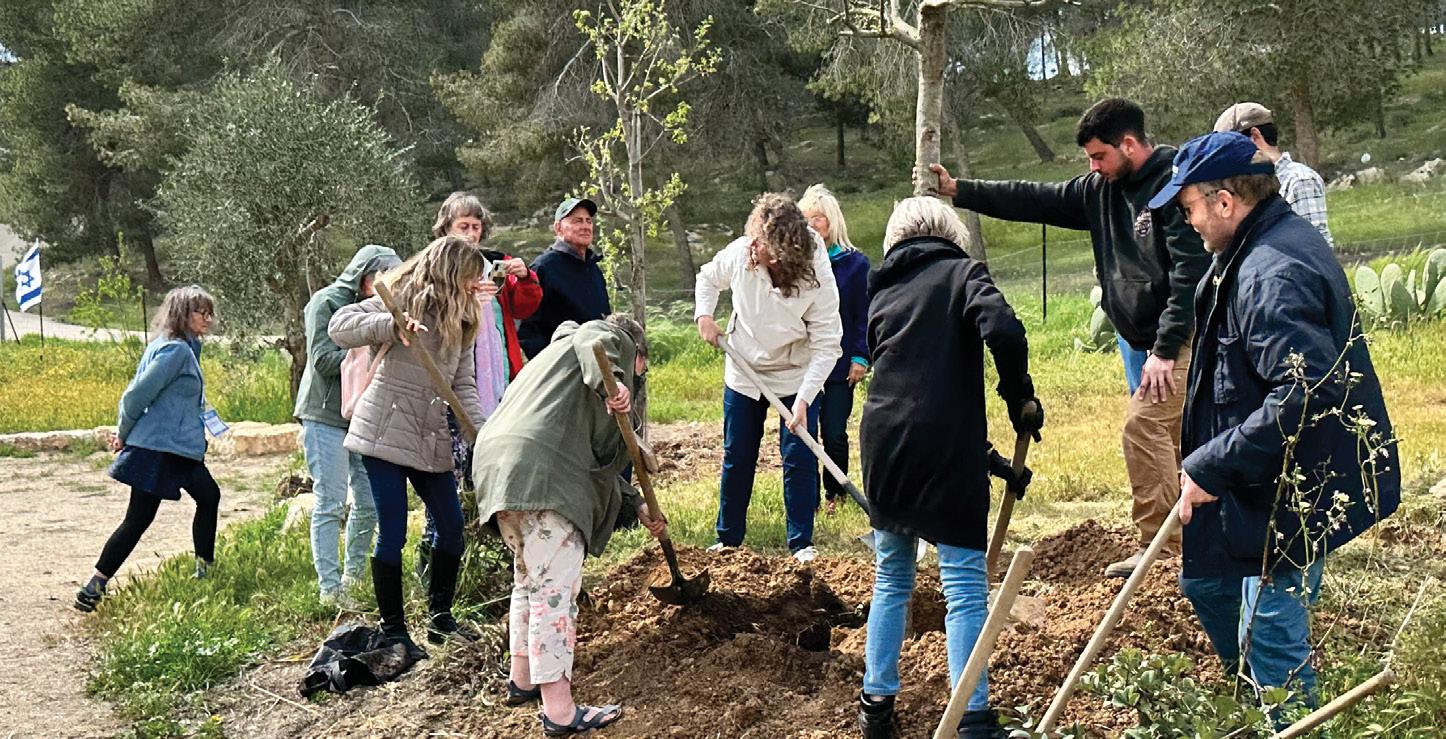
ICEJ solidarity mission delegation volunteering at the the Rimon Farm trauma therapy center.
The demand for mental health care in Israel has surged, especially among the many IDF soldiers struggling with some form of post-traumatic stress disorder (PTSD). Therapy is crucial not only for individuals who experienced trauma but also for those who lost loved ones, emergency first responders who witnessed intense suffering, and released hostages.
Recently, an ICEJ delegation visited the Rimon Farm Trauma Therapy Center near Beersheva, which the Christian Embassy is supporting. The unique farm features impressive vineyards, olive orchards, and lush artichoke fields. Here, therapeutic retreats and group therapy sessions offer solace and support to Israelis in urgent need of trauma care, while doing so in a pastoral farm setting.
The ICEJ is presently sponsoring trauma therapy at the farm for two specific groups: residents of Kibbutz Be’eri, where many Israelis were killed or abducted on October 7, and volunteers from United Hatzalah, a nationwide network of paramedics.
Speaking to our group, Rimon Farm Cofounder Nir Amitai highlighted the importance of already preparing trauma care programs even while the battle is yet raging. He noted that Israel’s need for mental health professionals is urgent, and the demand will be here for years to come.
Thus, Rimon Farm has plans to expand, with a goal to receive over 3,000 individuals for therapy in 2024. Some will undergo short-term treatment, while others will need more longterm care. Rimon also aims to set up more therapy farms in the western Negev.
Nir was grateful for the ICEJ’s support, saying: “Thanks to you, we can help people get back to normal life. It’s not a quick process; it’s a journey. We cannot do it alone, and with your support, we are not alone. Words cannot describe what I feel. Thank you so much.”
“At times I feel helpless, but my love for this country runs deep,” responded Doris Lüke, who joined our visit to the Rimon Farm as part of an ICEJ Germany solidarity mission to Israel. “I must bring information back to Germany to awaken fellow Christians.”
Recently, ICEJ staff visited the new central dispatch center of Magen David Adom (MDA), where Israel’s national blood bank is collected and stored. While there, we dedicated a new Medi-cycle donated by ICEJ Canada. In its first week of operation, the fully equipped Medi-cycle had already responded to more than 10 emergency calls.
Located near Ramle, the MDA center is home to the world’s most secure blood bank, kept 60 feet underground to guard against any attack. The facility is also where MDA’s fleet of ambulances are equipped and maintained. Yet the real backbone of MDA is its nationwide network of 20,000 staff and 33,000 volunteers. Many of those volunteers sprang into action on October 7 to treat and evacuate wounded Israelis. Amid the heat of battle, MDA lost over 20 volunteers, while Hamas deliberately targeted 14 ambulances. Nonetheless, MDA assisted some 1,000 injured Israelis within the first 24 hours, while its dispatch centers fielded over 21,000 emergency calls that day.
The visit to the MDA center gave our staff a greater appreciation for their work and service to the people of Israel. In the coming months, the ICEJ also will deliver two new ambulances to Magen David Adom.
You can help us provide more life-saving medical equipment to Israel’s first responders by giving generously to our Israel in Crisis fund.
Reach out to a hurting nation, by donating today at: www.icejusa.org/crisis



Despite facing a multifront war since October 7, Israel is still welcoming a steady stream of Jews from around the world as they continue to immigrate to their biblical homeland. Since October 7, Israel has welcomed 12,745 new immigrants. This comes amid a wave of global antisemitism, prompting a significant rise in Aliyah applications, most notably from France, Canada, the United States, South Africa, Ukraine, and Australia.
Starting in March, the ICEJ began sponsoring regular Aliyah flights for French Jews. The group flights from Paris are being coordinated by the Jewish Agency for Israel (JAFI). Danielle Mor from JAFI warmly thanked the Christian Embassy for its “critical support of Aliyah” at this time, noting that many more French Jews are expected to immigrate to Israel in the coming months. A recent Aliyah expo for medical professionals in France and Belgium drew over 450 Jewish doctors and dentists interested in resettling in Israel.
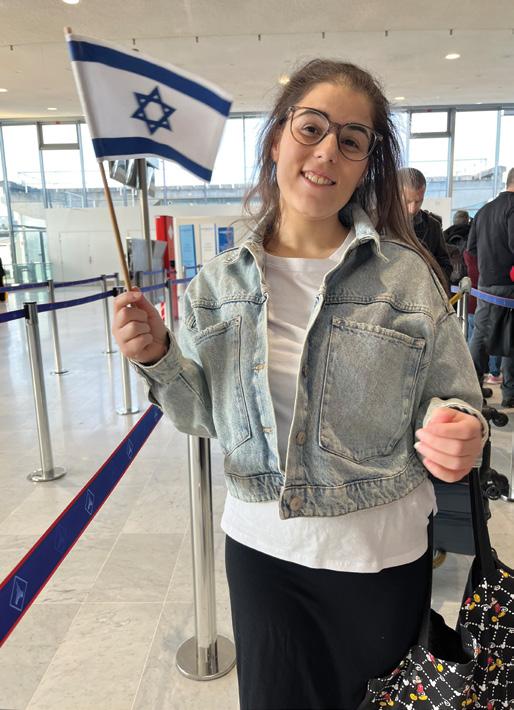
A new immigrant from France
For a group of 61 Ethiopian Jews, their long-awaited dreams of reaching the promised land finally came true in late March, when the ICEJ sponsored their Aliyah flights to Israel (bottom-right photo). This latest group had been part of a rescue operation of Jews endangered from last year’s tribal clashes in the Gondar region. JAFI acted swiftly to evacuate 200 Jews out of Gondar to Addis Ababa, and these 61 just needed to wait for their travel documents to depart for Israel. The ICEJ is also assisting with their integration costs.
Also in late March, seven Jews from South Africa left behind a country currently ruled by a government with a clear anti-Israel agenda and flew to the promised land on an ICEJ-sponsored Aliyah flight. ICEJ South Africa National Director Vivienne Myburgh traveled with the Jewish immigrants her branch was sponsoring on their monumental journey.
Over 500,000 Jews remain in South Africa, but they are increasingly leaving the country for Israel and elsewhere due to economic

downturns, high crime rates in the post-apartheid era, and the rising antisemitism impacting their country since October 7.
Since the Gaza war began, nearly 9,000 Jewish immigrants have arrived in Israel from Russia and other Former Soviet Republics. ICEJ has been asked by the Jewish Agency to help fund hundreds of flights in the coming months and help with pre-Aliyah activities to prepare new immigrants for life in Israel.
As more Jews prepare to make Aliyah from the nations, the ICEJ stands ready to assist them on their prophetic return home. Help us bring them to Israel by supporting the ICEJ’s Aliyah efforts.

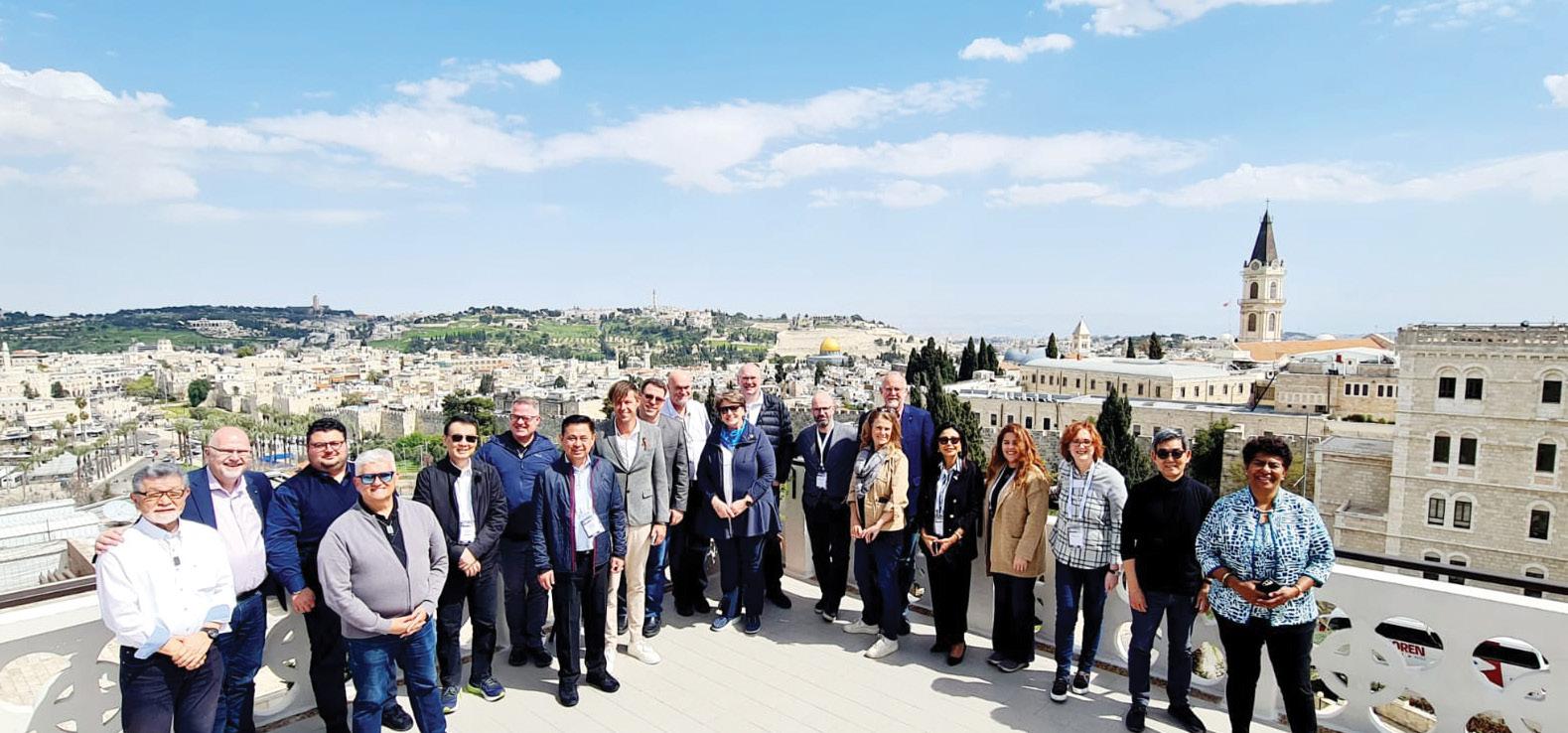
The ICEJ hosted its latest Christian Leadership Solidarity Mission to Israel in March, which resulted in a strong declaration of support for the Jewish State and people amid the current war with Hamas.
The mission consisted of 20 prominent Evangelical leaders from 12 nations representing millions of Christians worldwide. The global ministry leaders came from Argentina, Australia, Brazil, El Salvador, Fiji, Germany, Indonesia, Italy, Japan, Netherlands, Tanzania, and the United States.
The group first visited places along the Gaza border linked to the Hamas massacres on October 7, including Kibbutz Be’eri, the Nova Music Festival site, and a parking lot filled with 1,200 burned-out cars from the terrible day of carnage. They also heard from Eshkol Region Security Chief Ilan Isaacson and IDF Lt. Col. (Res.) Yaron Buskila, who both bravely led efforts to turn back the Hamas onslaught.
Participants also met with Israeli Foreign Minister Israel Katz in his Jerusalem office and later heard from Emmanuel Nahshon, deputy director general of the Foreign Ministry, as well as Rachel Goldberg, mother of hostage Hersh Goldberg-Polin, who lost his lower arm in a grenade explosion before being taken into Gaza.
Finally, the Solidarity Mission toured the northern border area, received a security briefing by IDF Maj. (Res.) Elliot Chodoff, and was hosted by Fijian troops in the United Nations Disengagement Observer Force (UNDOF) contingent in the Golan. The group then visited the ICEJ’s Home for Holocaust Survivors in Haifa to see measures taken to
protect the home’s elderly residents in case the war escalates in the North.

“I want to thank the ICEJ for allowing us to have the veil pulled away from over our eyes. To me, that’s what this trip was all about,” said Dr. Rev. Suzette Hattingh (pictured on left) from Germany/ South Africa. “Virtually every day, there was something that peeled away another misunderstanding, or veil, like scales, from my eyes. People across the world do not know … how incredible the shock was from the October 7.”
“I have come to the conclusion while here that there is a lot of fake news going around about Israel. A lot of things in the news, they lie, they twist,” said Mattheus van der Steen from the Netherlands. “I also am surprised how strong the Jewish people are, spiritually as well … We should have everyone we talked to preach in our Western churches. Seriously, the messages of these people and their faith in God … is just amazing.”
“I was impacted by those who survived
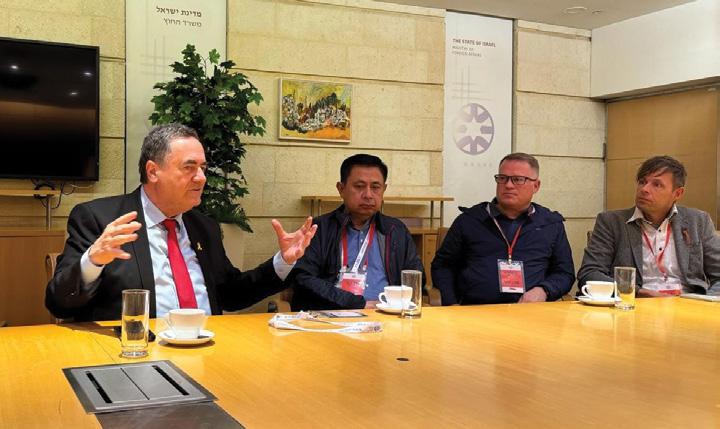
different situations of great crisis, and what I was stunned to see was the lack of hate in their sharing, even talking about people with loved ones still held hostage. I was amazed by that,” said Rev. Omar Cabrera of Argentina.
At the conclusion of their solidarity mission, the Christian leaders issued a joint statement in support of Israel in its ongoing battle against jihad terrorism. The statement noted that the mission delegates were “impressed by the strength, faith, and resiliency of the people of Israel in the face of the devastating attacks they suffered and the alarmingly swift way in which the international community has forgotten their pain and turned on Israel. … Israel’s cause remains just, and we encountered a united nation well on its way to a necessary and deserved victory.”
The statement also said that Israel’s wounds from October 7 will nevertheless remain grievously open until all the hostages are freed. The delegates further attested that “the cruelty of Hamas knows no bounds, even toward its own people.”
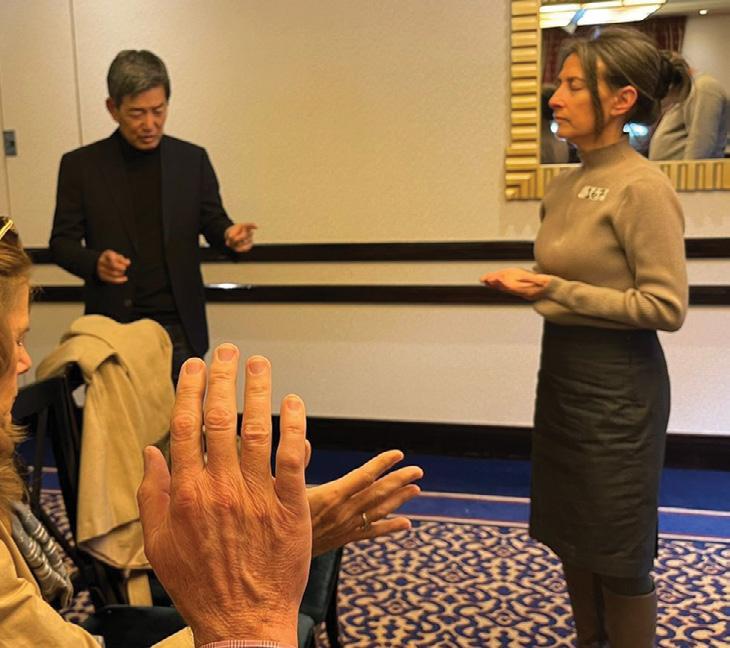

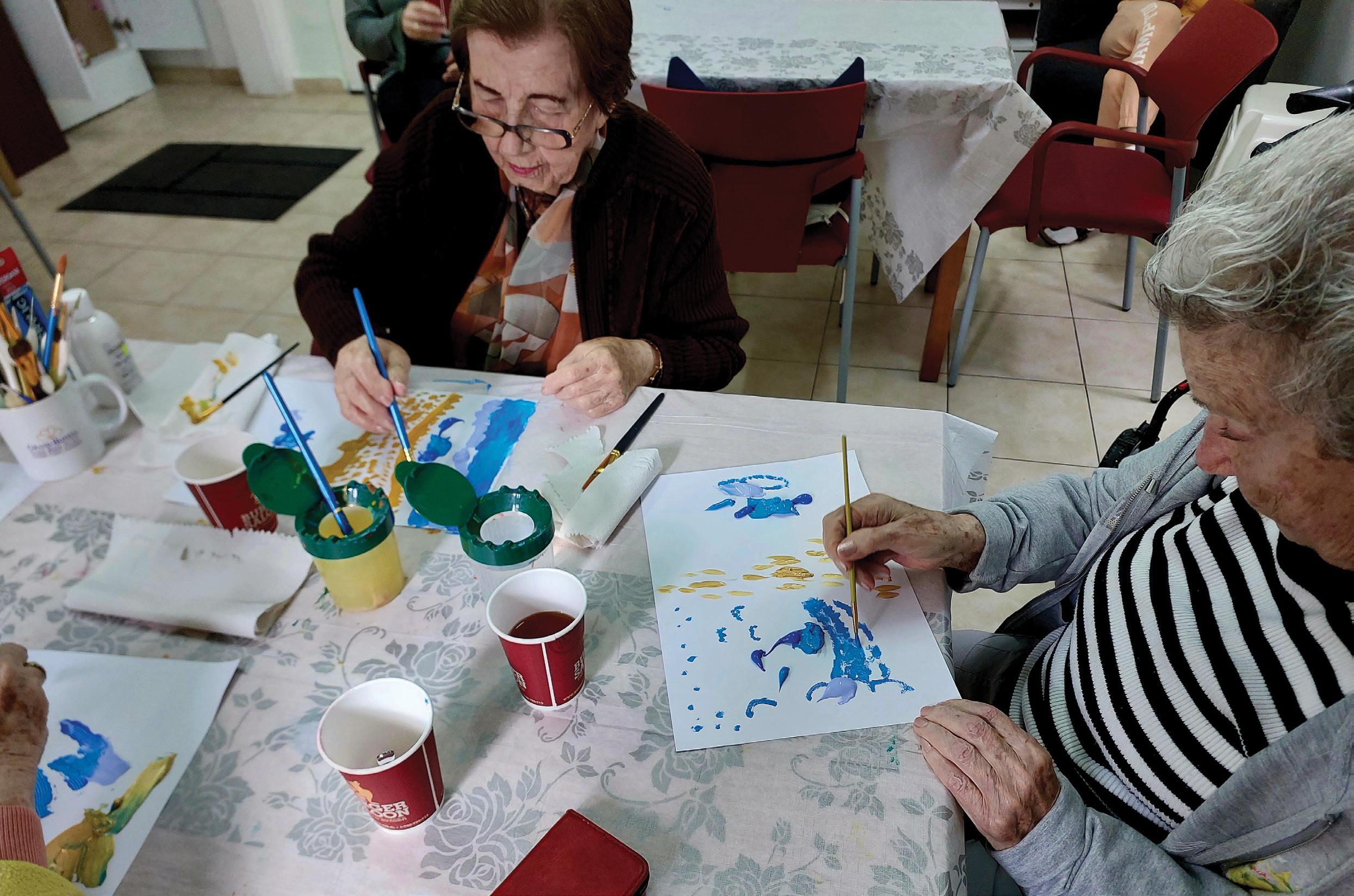
he ICEJ is currently constructing a safe room in our newest apartment building at the Home for Holocaust Survivors in Haifa. Seven of the elderly Jews evacuated from the Ukraine war last year are now living in the building, and we want them to feel protected from the threat of Hezbollah to northern Israel.
Even though the work to turn a spare room into a safe place is a little loud and dusty at times, resident Natalia came especially to say thanks. “I do not mind the noise and dust because I am so grateful that you are caring for our safety,” she said. “It makes me feel much more secure in these very tense times.”
Sixteen of the current residents at the Haifa Home came to Israel after fleeing the war in Ukraine, and we are taking every measure to ease their minds about the war they now find themselves in.
Every year we prepare Pesach (Passover) packages for Holocaust Survivors in the Haifa area who are in need and still live alone. Besides matzah (unleavened bread)
and other traditional Passover fare, some extra food items were added to this year’s packages just in case of emergencies. Groups from high-tech companies, the Maccabi Haifa soccer team, high school classes, and IDF soldiers came to help pack parcels for a few hours each. Our Christian Embassy staff at the Haifa Home had the joy of lending a hand to fill Passover gift packages too.
Despite the constant threat of war from the North, life goes on. In art therapy, the residents talked about the story of Passover.
The Survivors enjoyed painting their impressions of the Exodus from Egypt in a celebratory atmosphere topped with different kinds of tea and music. We plan to hold an exhibition of all their work and invite their families and friends for the display.
Holocaust Survivor’s
Manya, a long-time resident of the Haifa Home at age 91, spends time behind her computer daily. Besides writing a poem about whatever happened that day, she
Preparing Passover packages for Holocaust Survivors in Haifa
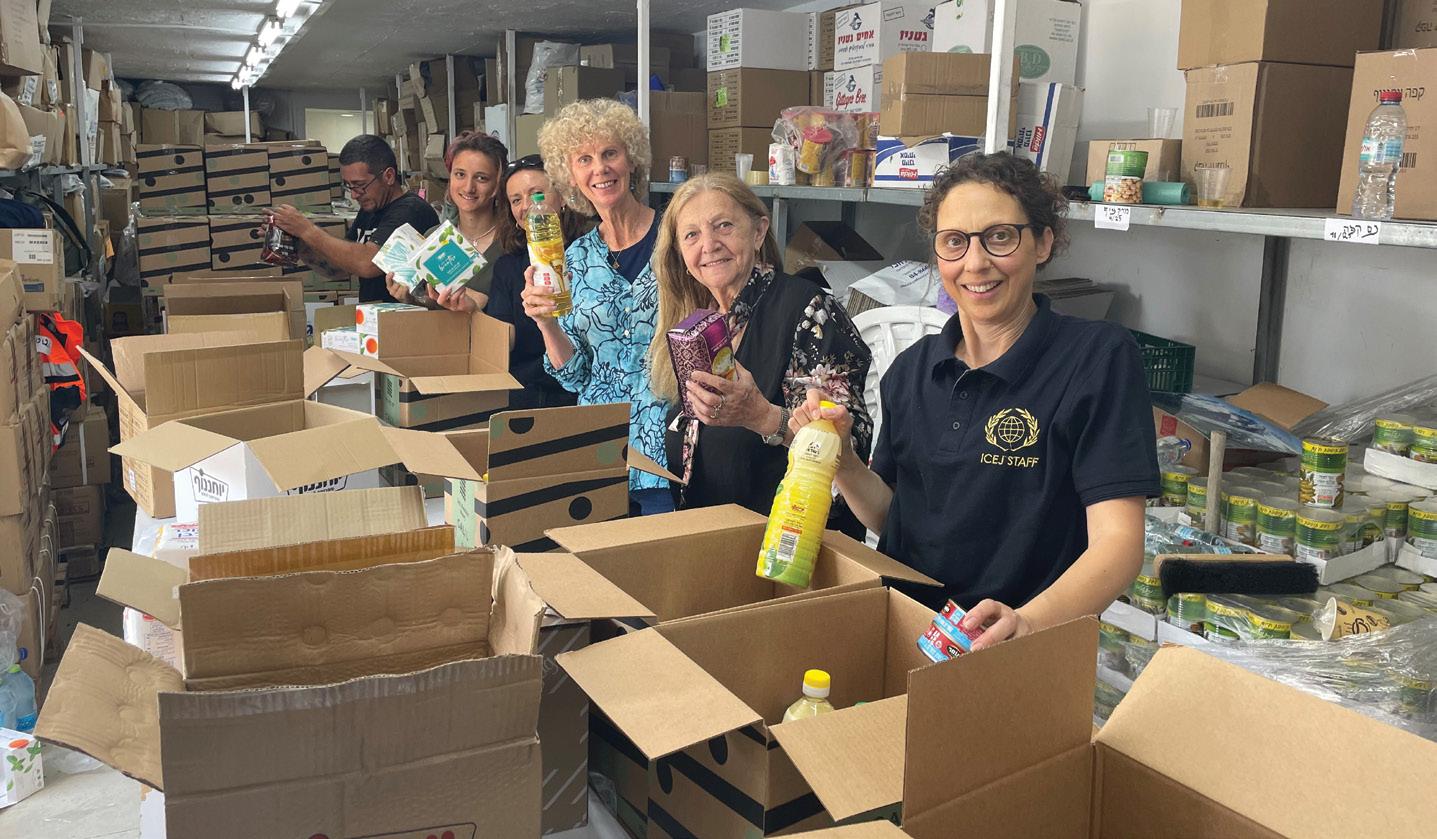

adds a drawing with it. Manya, a seasoned artist, taught herself to draw on the computer during the coronavirus.
Manya shared a recent poem about the dark Sabbath October 7 massacre, translated from Hebrew:
A Glance at “The Black Shabbat”
Rage painted Shabbat black, not by paint, but by blood. My thoughts wandered afar, as if my eyes could see all the outcome, wanting to cry out. Emotion overflows.
The heart responds, grief, it wails.
The soul awakes, the sights brought back memories from the distant past. Then, the comparisons start.
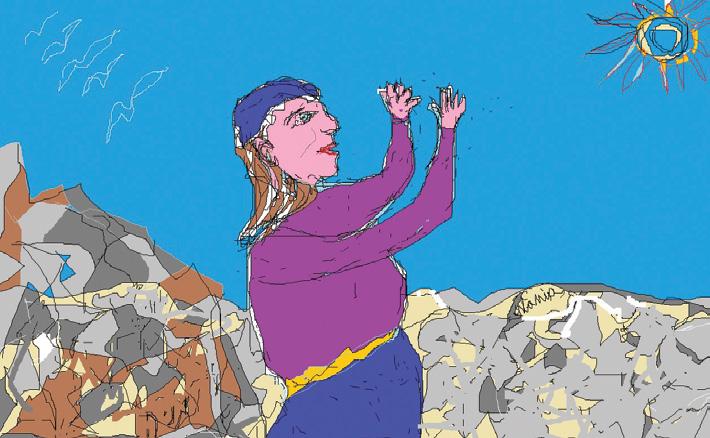
Recently, the ICEJ has brought several Christian solidarity groups to visit the Haifa Home. The sight of tourists from abroad in this time of war is so encouraging and strengthening for our residents and Israeli staff. Israel feels so alone in this difficult war, where there is still no end in sight. The fact that Christians from all over the world show their solidarity and support means the world
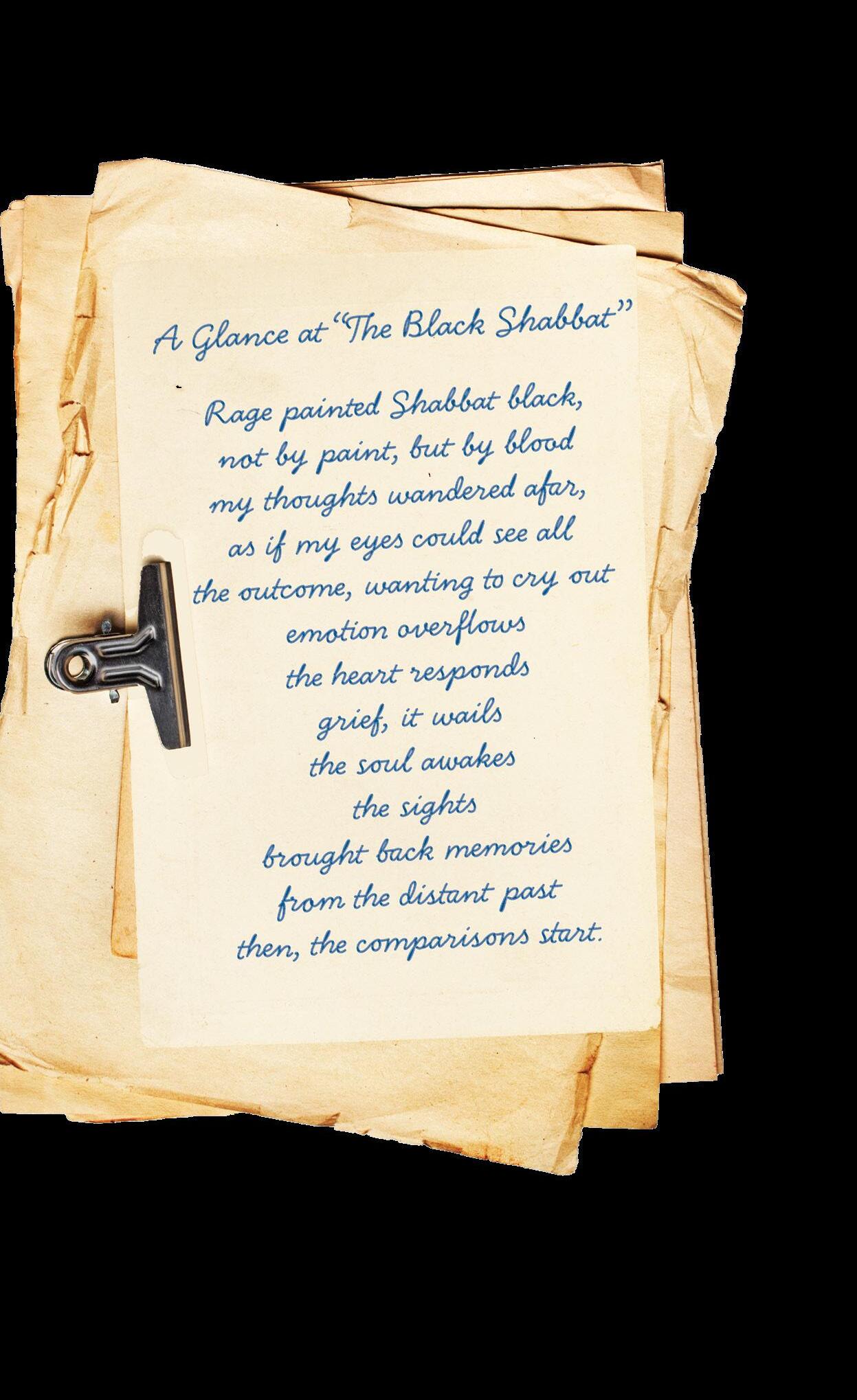

situation of increasing antisemitism, especially back in Germany.
“Two of the residents we visited had written down their stories and had them published in German. How special it was to have met them in person and be able to read their story while at the Home.”
During lunch in the dining room, the couple met many other residents and staff and
Tobi and Debora Schabel, a couple from Darmstadt, Germany, had taken a holiday from their work to help Israeli farmers. They also visited the Haifa Home to encourage the residents and staff. They came bearing gift boxes with special flowers that do not need water, bars of lavender soap, and a beautiful card, which they distributed to residents, staff, and caregivers. Afterward, they wrote us about their impressions
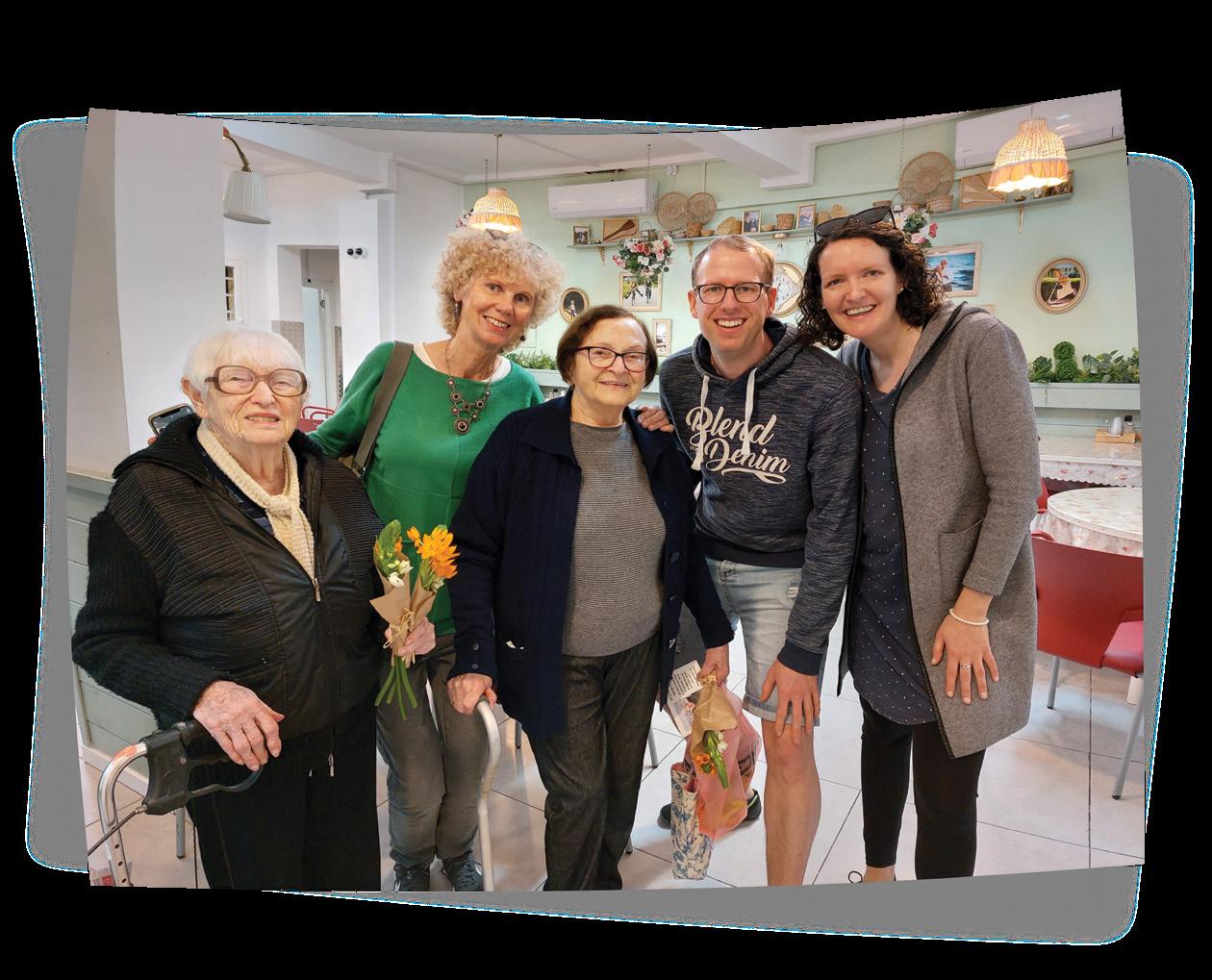
“The personal encounters with the Survivors themselves and the loving relationships that the team maintains with the residents of the facility were moving,” they shared. “The entire atmosphere in the Haifa Home is characterized by appreciation, affection, and trust. We were very happy to get to know different residents personally and to communicate in different languages and with our hands and feet.
“We were able to celebrate the birthday of a Ukrainian resident who has been living in the Home for two years,” the Schabel’s continued. “And we had a long conversation with a resident who was born in Germany about the current
passed along greetings and gifts from their families and friends in Germany.
During this time of war, such small signs of solidarity and encouragement were received with surprisingly great appreciation and at the end of the day, the couple said goodbye extremely encouraged and blessed.
The Schabels concluded: “The work of the Haifa Home is a great blessing, and we greatly value the ministry that the staff and volunteers here provide to the Holocaust Survivors on behalf of many Christians in Germany and around the world every day. Thank you so much!”

Palestinians describe Israel as an “occupier,” which places the Israel-Palestinian conflict in the context of an oppressor and the oppressed. Palestinian violence is therefore overlooked if not condoned as the legitimate reaction of a victim of oppression. This narrative portrays Hamas—the jihadist terrorist organization whose charter calls for the genocidal annihilation of the State of Israel—as the victim fighting for freedom from the occupation and serves to legitimize it and its barbaric murder of Israelis on October 7.
The key question here is if Israel is “occupying” those areas illegally, as Palestinians claim. Let’s unpack a bit of history to clarify what actually happened.
The region known as Palestine lay in the heart of successive Islamic empires for almost 1,300 years. It was largely barren and unpopulated compared to today, and its population was predominantly Arab except around Jewish holy sites, including Safed, Tiberius, Hebron, and Jerusalem. In the 1800s, Jewish immigrants fleeing pogroms in Russia began to build farming communities, and Arabs moved there from surrounding areas to take advantage of better-paying jobs. The two populations grew at similar rates with little conflict until the 1920s, when the Middle East underwent seismic changes after the defeat and dismantling of the Ottoman Empire in WWI.
The British were given some Ottoman lands, including Palestine, under mandate to prepare them for self-rule. Even though the Balfour Declaration declared Britain’s intent to establish a Jewish homeland in Palestine, they gave almost 78 percent of Palestine to the Arabs and established what became the Hashemite Kingdom of Jordan. The remaining 22 percent of Palestine is the area between the Jordan River and the Mediterranean Sea, and certain Muslim leaders created an opposition to the establishment of Jewish sovereignty there.
After over 20 years of what became an impossible situation, the British turned it over to the United Nations, who in 1947 approved a plan to partition the land into two states—one Jewish and one Arab. The Jews declared the State of Israel, but the Arabs rejected the plan, and five Arab armies attacked the newfound State of Israel. At the end of the War of Independence, Egypt had occupied Gaza, Syria occupied the Golan Heights, and Jordan had taken the central part of the county, expelling 17,000 Jews and naming it the West Bank of the Hashemite Kingdom of Jordan, albeit with no international authorization—even the United Nations said Jordan had no legal claim to it.
In June 1967, faced with an imminent invasion by Egypt, Syria, and Jordan, Israel launched a series of preemptive strikes. After the short
but victorious six-day battle, the Jewish State captured land from all three—the Golan Heights in the north from Syria, Gaza and the Sinai from Egypt, and the West Bank and East Jerusalem from Jordan—and absorbed over 1 million Palestinian Arabs.
As a result of the Six-Day War, Israel had gained control of the West Bank, including the Old City of Jerusalem and Judaism’s most holy site—the Temple Mount. They had thousands of years of history embedded in the territory—the West Bank is biblical Judea and Samaria and full of holy sites like the Cave of the Patriarchs, Rachel’s Tomb, and the Tomb of Joseph. It included Judaism’s fourth holiest city, Hebron, where Jews had lived for centuries until they were kicked out in the 1920s. They had been free to live and settle throughout the “West Bank”—even under the Ottomans—before it was occupied by Jordan.
It is important to note that since the “West Bank” was still considered previous Ottoman lands not yet given over to a country, it is considered “disputed” territory by international law, not “occupied.” Israeli communities in the “West Bank” are therefore not considered illegal, and to the Jewish people, they are simply reestablishing what was already there before Jews were expelled in 1948.
As a result of the Six-Day War in 1967, Israel controlled Gaza. The 1978 Camp David Accords attempted to provide some sort of self-rule for the Palestinians living there, but to no avail. The Oslo Accords in 1993 also fell short, though Israel surrendered governmental control of Gaza to the Palestinian Authority (PA) as part of the agreement, and in 2005, the Israeli government decided to move out of Gaza, mandating all Israeli settlers evacuate the area. Gaza soon voted Hamas in, and by mid-2007, Hamas had complete control over Gaza. On October 7, 2023, when Hamas brutally attacked Israel, Gaza was under the control of the Hamas government—not under Israeli control. Israel had moved out 18 years earlier.
Despite this well-documented history, Israel is being branded an occupying power in not just the West Bank and Gaza but all of Israel, even though Jewish history there goes back 3,500 years. Today’s Judea and Samaria are the birthplace of the Jewish people, who were ruled for millennia by a Jewish kingdom. Even Judea was named after Judah, one of the 12 tribes in the Bible, from which the word “Jew” is derived. We must fight the rewriting of this history and vilification of the Jewish people because the enemies of truth will not stop with Gaza or even the West Bank but will continue demonizing Israel until they control it all—from the Jordan River to the Mediterranean Sea.


Zechariah 4:6 october 16-23, 2024 SAVE THE

‘‘Not by might nor by power, but by My Spirit,’’ Says the Lord of hosts.
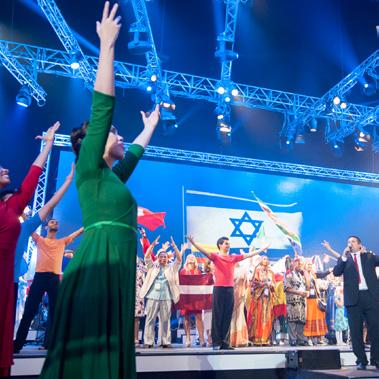
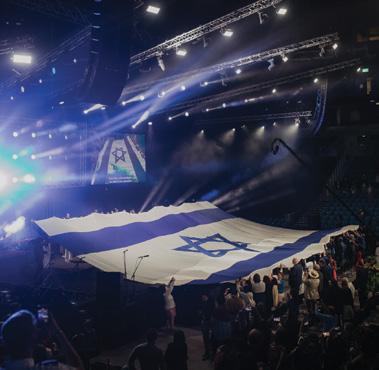
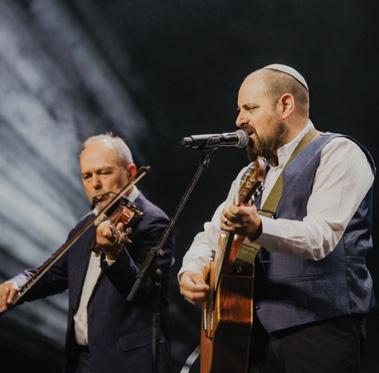
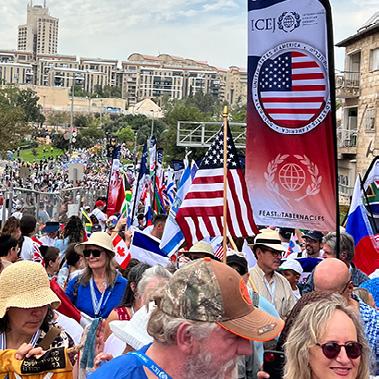
For more information visit: www.icejusa.org/feast-tabernacles